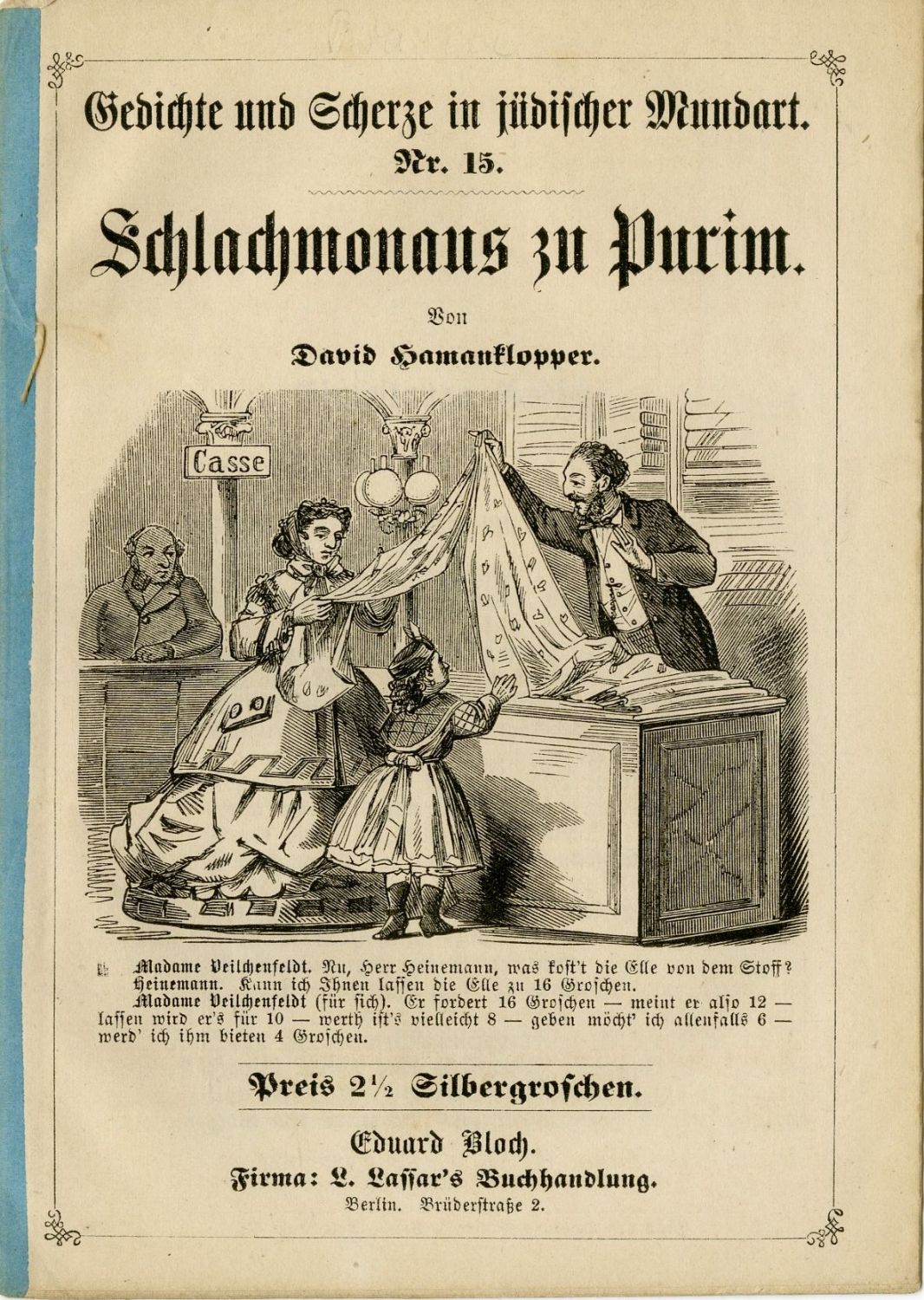
booklet "Schlachmonaus zu Purim" - Poems and jokes in a Jewish dialect for Purim, by David Hamanflofer. Published by Lassar's, Berlin, [1877]. rare.
A collection of short jokes for Purim: jokes about the enormous size of the new synagogue in Berlin, about Jewish business owners, Jewish cooking, Jacob Zilberstein, the relations between the aristocracy and Jews, jokes about the Jewish banker, and more.
15 pages. 16 cm. Very good condition.
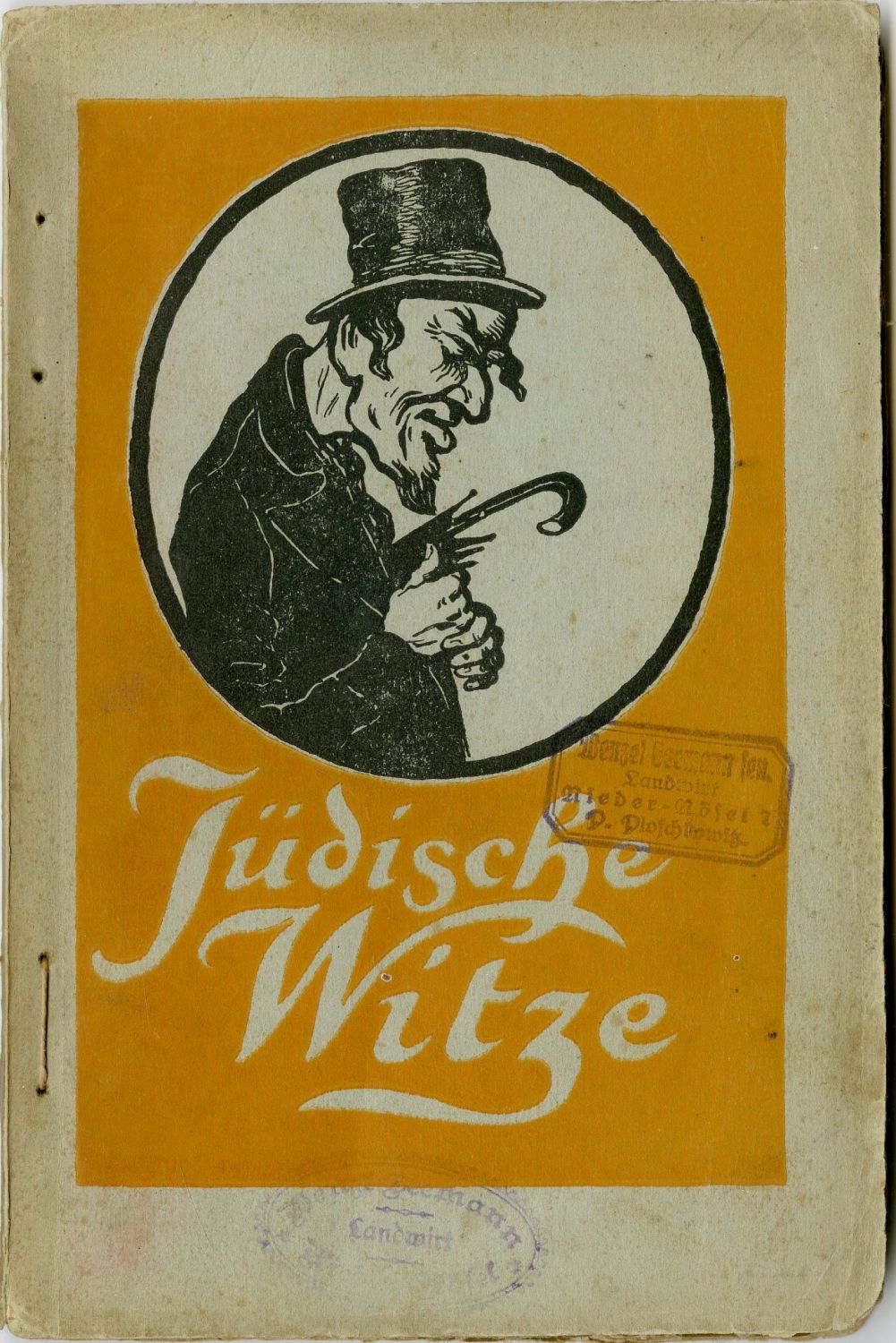
Judische witze - Jewish jokes, edited by Kalman Levy. Published by Max Fischer's Bookshop, Dresden, c. 1890 - first edition. Rare.
A huge collection of Jewish jokes on a wide variety of topics surrounding the Jew. The nature of the Jew, holidays, commerce, politics, rabbinate, cleanliness, the Jewish market, the Jewish family, Jewish foods and the Jewish table, Jewish clothing, and more.
[2], 79, [1] p. 20 cm. Very good condition.
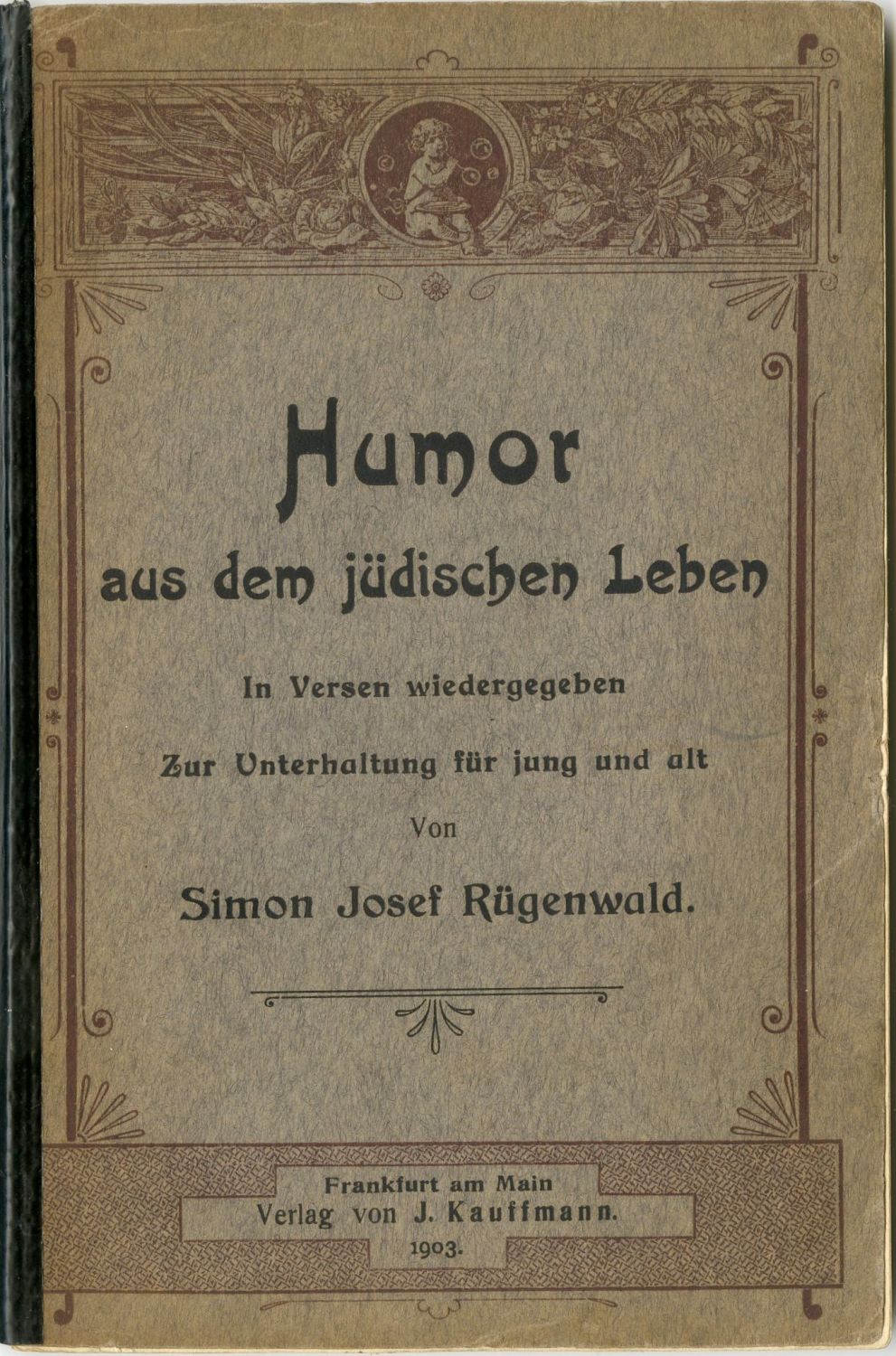
Humor aus dem judischen Leben - Humor from Jewish Life, by Simon Josef Rugenwald, Kaufmann Publishing, Frankfurt am Main, 1903. German. rare.
A book of Jewish jokes and humor, about Jewish life and customs - jokes about the Jew's obsession with cleanliness, thrift, marriage, the worries of the Jew, Mendelssohn jokes, the Jew on holidays, the way of thinking of the Jewish merchant, and many more. An interesting introduction in praise of the people of Israel who, despite all the suffering and the long exile, always when you pass by the houses of the Jews, you will hear the laughter emanating from everywhere. Exile did not have the power to dampen the joy of life and laughter of the Jew. The author writes that many of the humor in the book are based on 'old Jewish humor' from previous generations.
VII, 93 p. Very good condition.
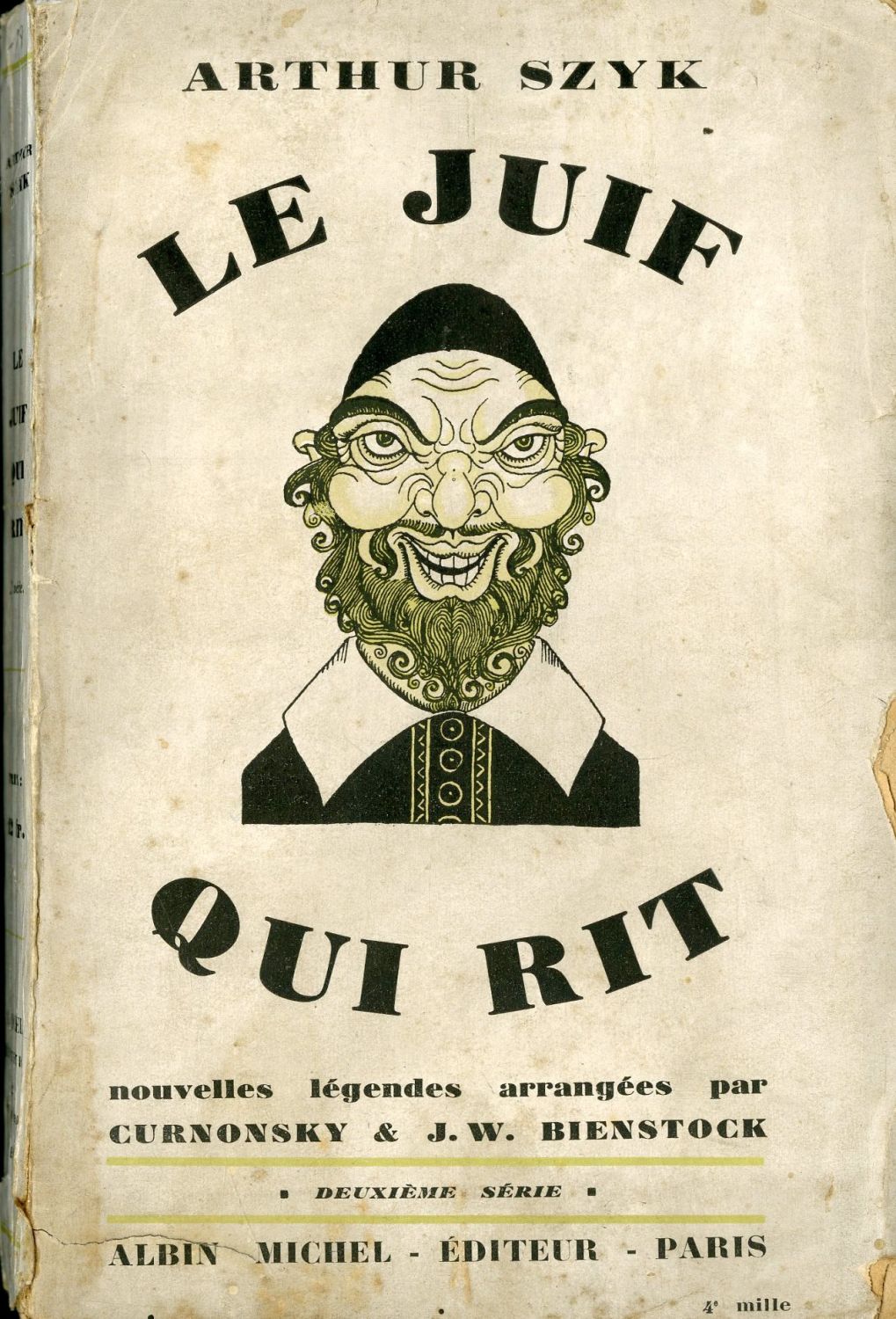
Le Juif Qui rit, Légendes Anciennes et Nouvelles [The Laughing Jew, Old and New Tales], edited by Curnonsky, & Bienstock, J-W, introduction by M. Anatole de Monzie. Paris, [1926]. French.
Humorous scenes from Jewish life in pre-war Europe divided into themes that surround Jewish life, accompanied by dozens of cartoons and humorous illustrations across each page depicted in short sentences by the artist Arthur Szyk. A rare book from the period of Szyk's early creation.
221, [1] p. 19 cm. Slight tears in the spine and the edges of the cover. Good condition.
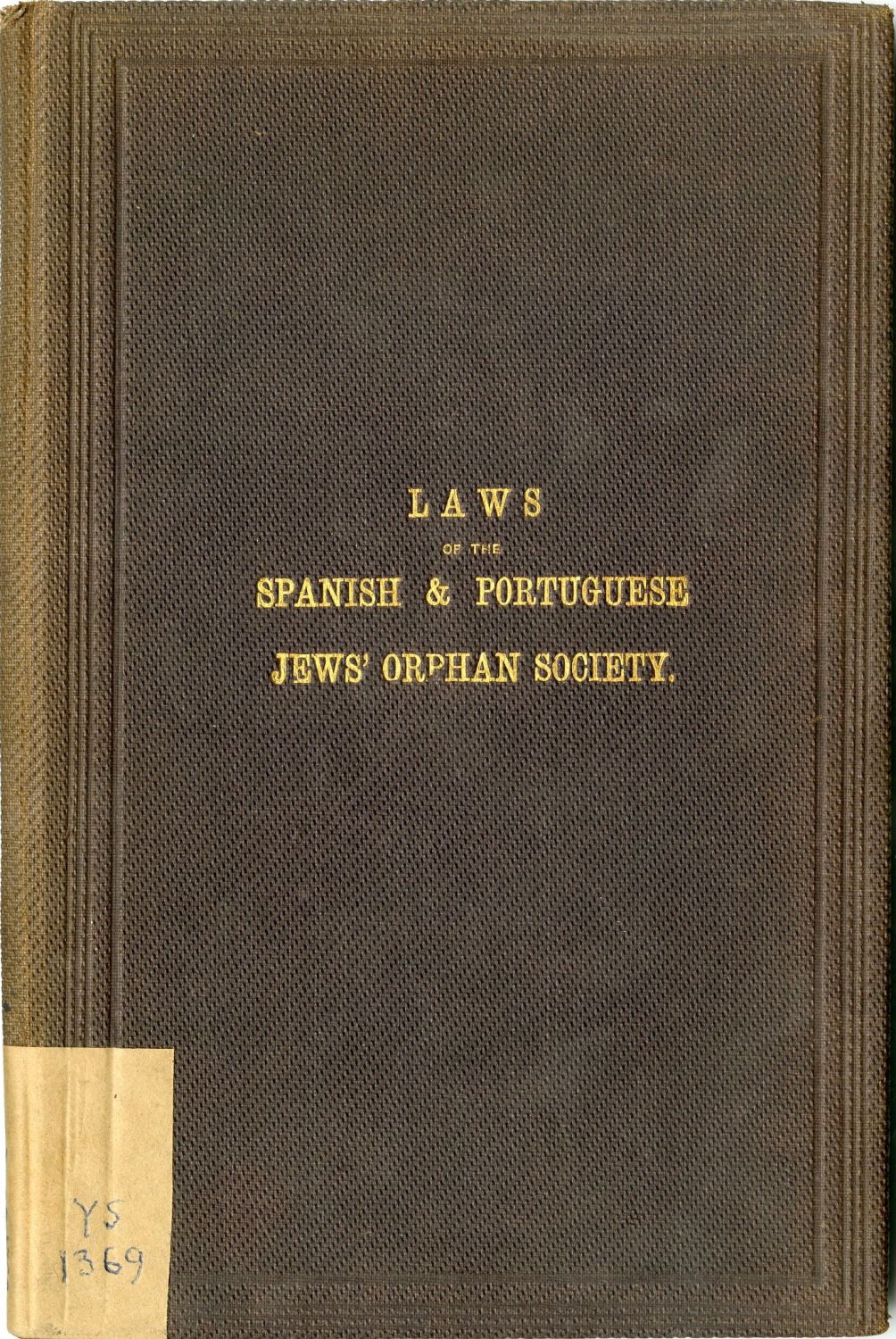
Laws of the Spanish and Portuguese Jews' Orphan Society… of the Spanish and Portuguese Jews' Congregation. London, 1885. Regulations of the company "Shaare Ora and Avi Yatomim" for orphans from the Spanish and Portuguese congregations in London.
The society was founded in 1703. The regulations deal with the joint inheritance of the association, division of roles and powers, the days of the meetings, an interesting chapter dealing with the women's committee of the association - this committee was composed of six women who were responsible for the management of the house and their role was to recommend to the managers any action required for the benefit of the orphans for their education (It is rare to find women in a managerial position during this period), regulations concerning the age of the children admitted to the institution (only children between the ages of seven and twelve were admitted, and they could stay in the institution until the age of 14 only if they behaved properly), the institution took out of its gates a child who was found to be sick with an infectious disease , the children's prayer was held in the Portuguese synagogue. In addition, there are sections dealing with the clothing and other physical and spiritual needs of the orphans. On the page after the cover there is a list of about 100 donors and subscribers. The last pages contain the text of the early deed signed in 1756 regarding the money used for the orphanage, by Moses Lamego.
36 p., 22 cm. Fancy cover with golden lettering. Good condition.
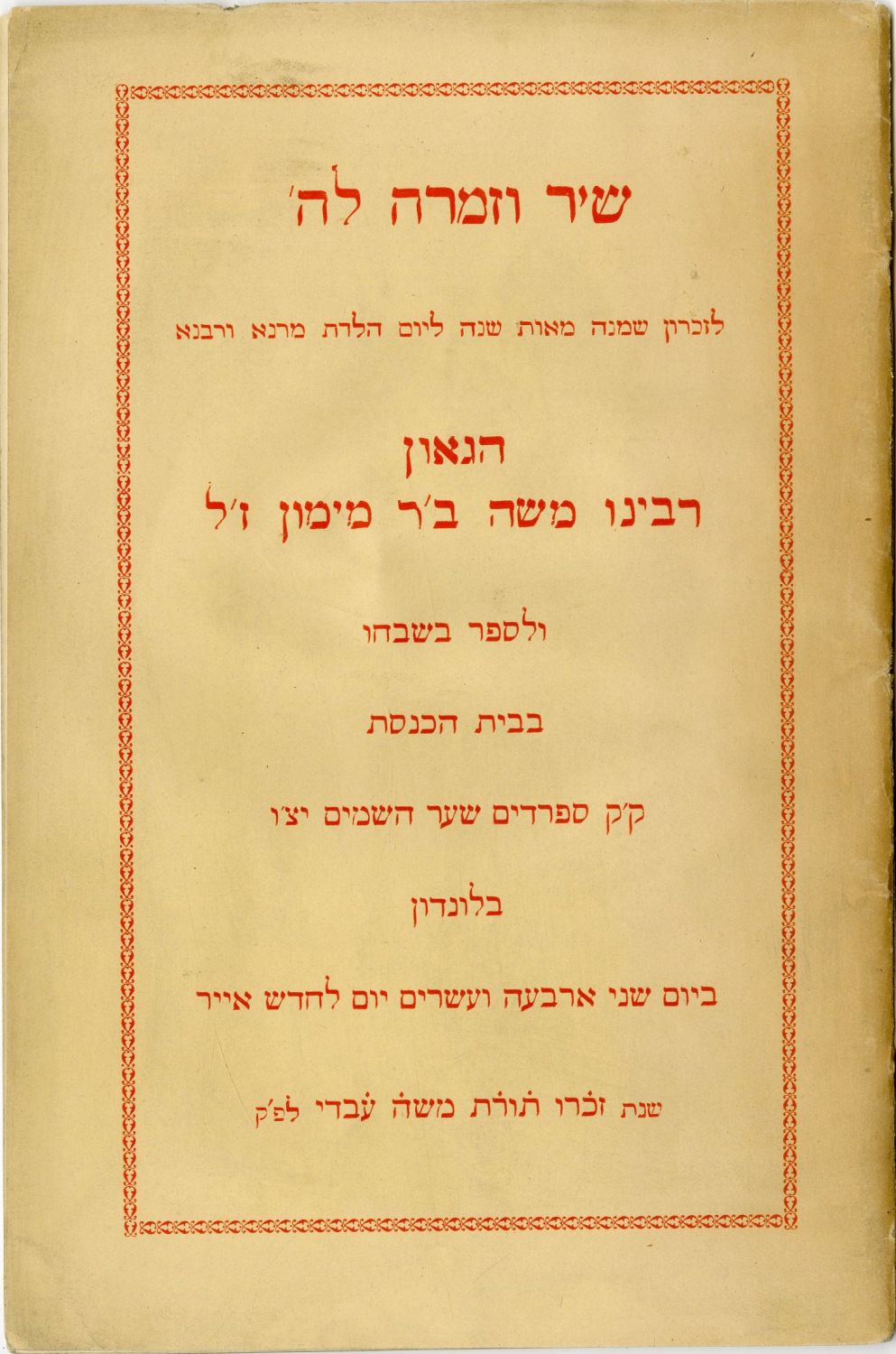
SERVICE OF PRAISE AND THANKS GIVING to commemorate the 800th anniversary of the birth of Moses Maimonides. KK Sephardim, a one-off publication of the Shaar Hashemim Synagogue, London, 1935. Hebrew and English page by page. A prayer booklet and special hymns to mark the occasion .
Mincha prayer, three laps, the blessing of 'HaNoten Tshuah LaMelachim', a blessing to the crowd, a blessing to the sages of Israel, a psalm of thanksgiving in honor of Moses, the man of G-d - a psalm specially composed for the occasion in honor of the Rambam: "... it has been eight hundred years that Judaism has been in danger ... You established over us a faithful shepherd...who was our Rabbi Moshe ben Maimon...", constant lighting of a candle for the upliftment of Rambam's soul, Ashkava l' Rambam, Aleynu LeShabeach, and 'Yigdal El-kim Chai'.
18 pages. 22 cm. Good condition.
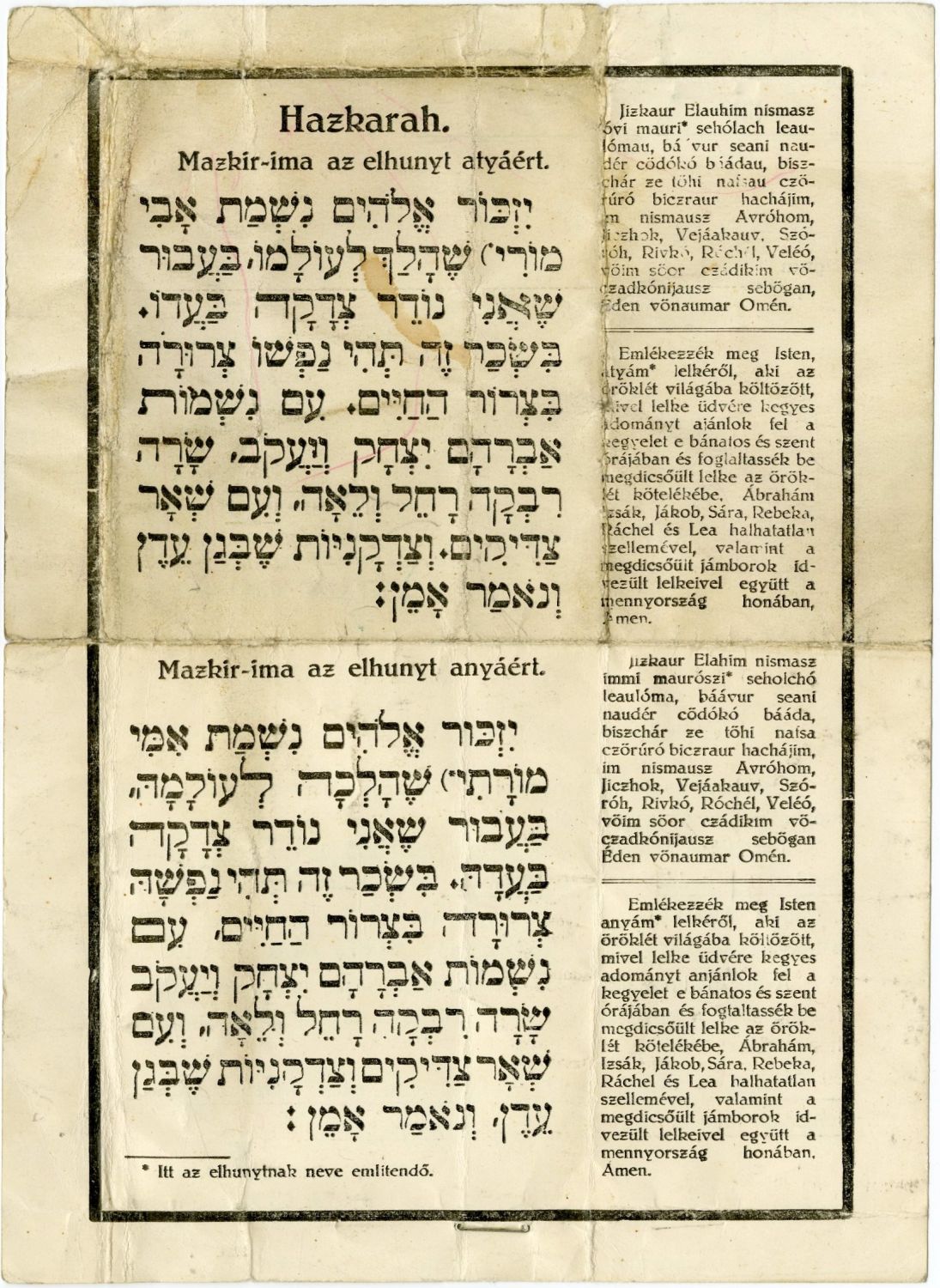
The text of the "Yizkor" prayer in Hebrew with a Hungarian translation on the right, which was printed on an opens postcard on the other side, published by the "Poel Tzedek" company - the Czech Republic. Sent to a friend Dr. Falu from the Jewish community in the Czech Republic in preparation for Passover, and signed with an ink stamp from Budapest 1918.
"Yizkor" prayer printed on an opening postcard - the Yizkor version for the father, and the version for the mother, translated into Hungarian on the right, and surrounded by a black frame. On the other side there is a printed text addressed to a "dear faithful friend" in which the heads of the community ask the person for whom they will pray the prayer of "Yizkor" on Passover to send charity using a special form attached to this postcard.
22x15 cm [open]. Fold marks. Slight tears in the margins. Good condition.
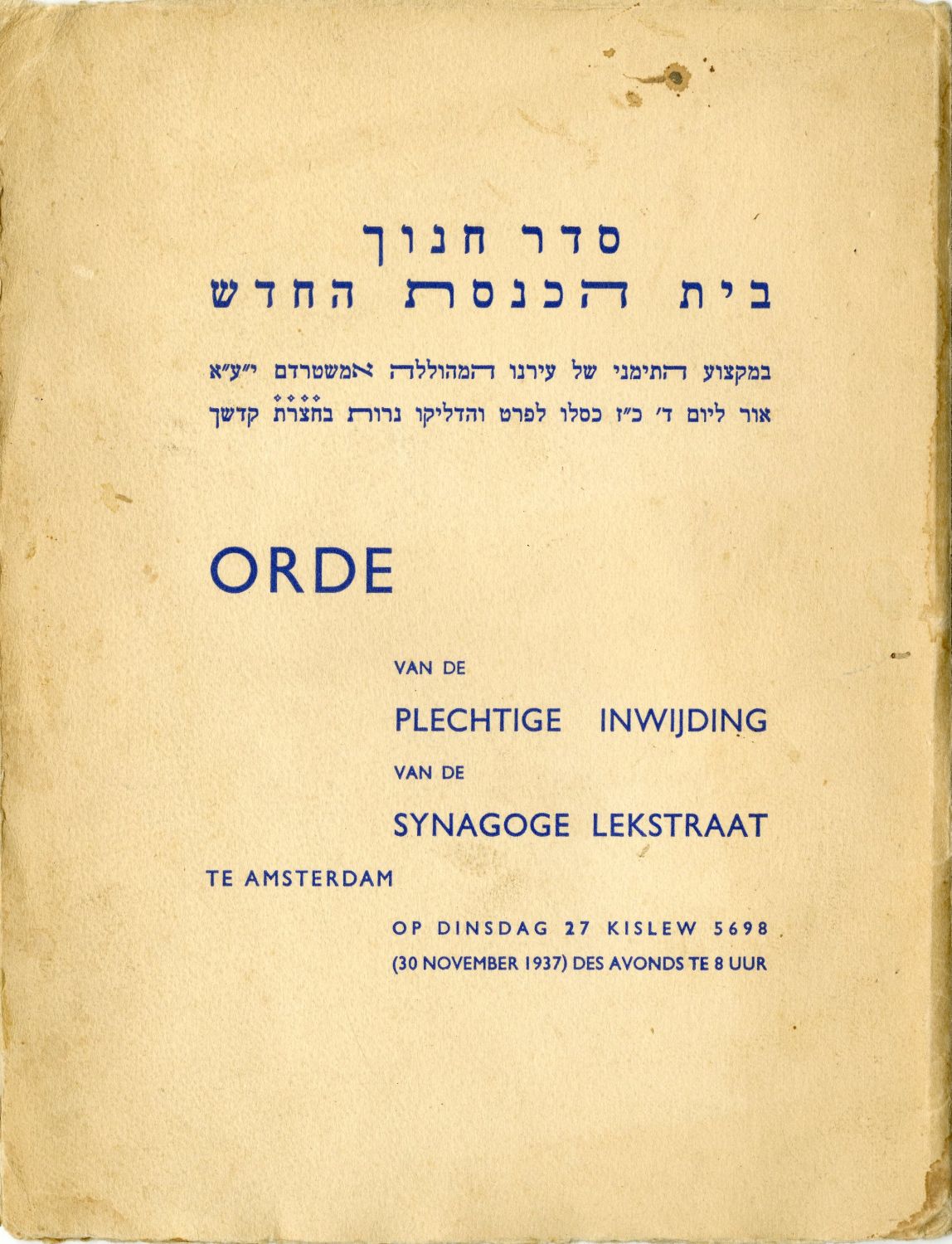
The inauguration of the new synagogue in the South of our glorious city Amsterdam, Kislev 27, 1937. Hebrew and Dutch page by page.
A special prayer booklet issued on the occasion of the inauguration of the Eilberg Synagogue in Amsterdam in the midst of the Hanukkah holiday 1937. In the booklet, Shir Chanukat HaBayit, shir HaMa'alot, Hakafot, a special song: "Shomeah Tfilah Lecha Nariah", "The Giver of Salvation" to the peace of the queen's majesty Wilhelmina Queen of the Netherlands, a song of thanks, Piyut Maoz Tzur for Hanukkah.
18 p. 25 cm. Good condition.
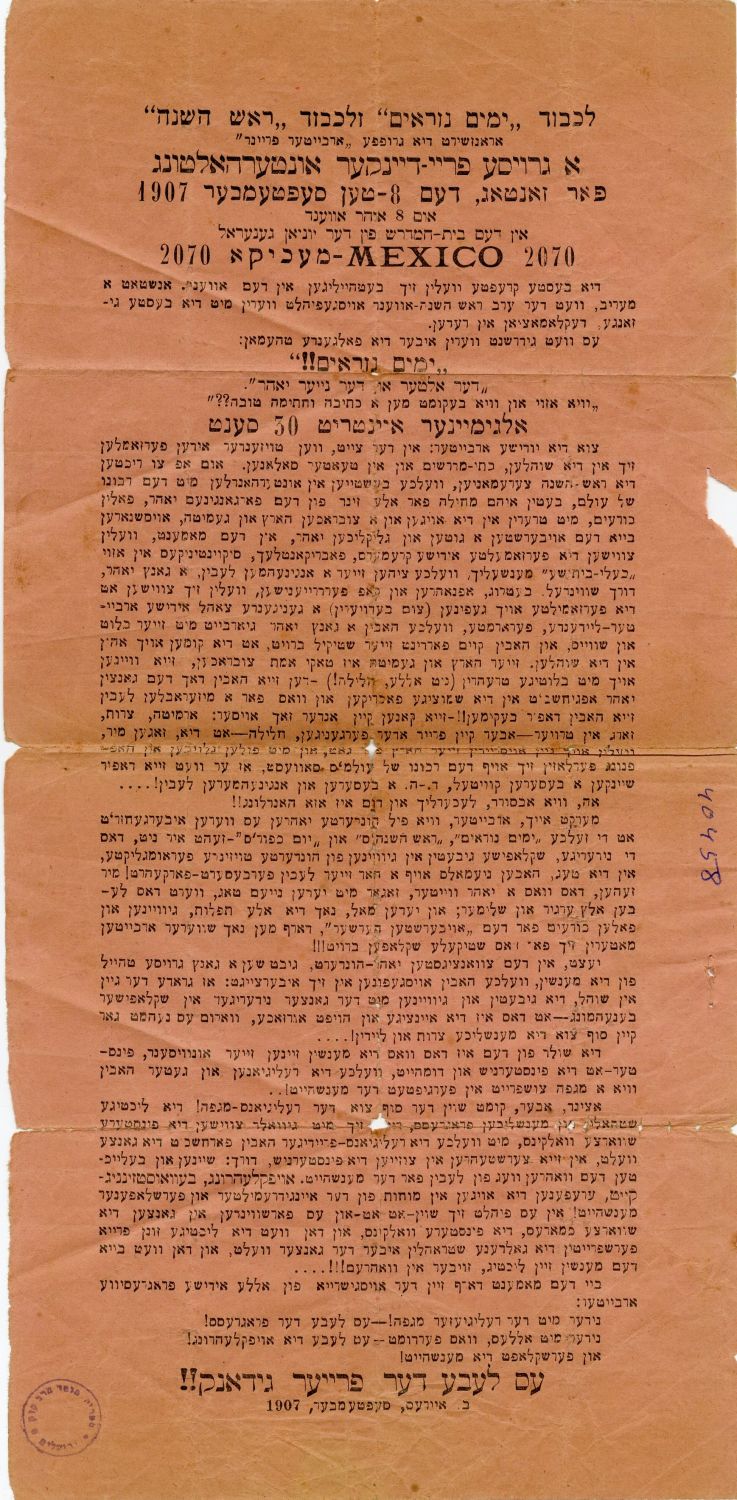
"לכבוד ימים נוראים ולכבוד ראש השנה אראנזשירט דיא גרופפע ארבייטער פריינד" - in honor of "Yamim Noraim" and in honor of Rosh Hashanah for the group of working friends..." - printed festive poster for the worshipers of the "Beit Midrash von der Union General" in Buenos Aires. Argentina, September 1907. Yiddish.
The poster addresses the Jewish public with the promise that if they wish to achieve a good signing for the new year, this is only possible by helping the poor workers of the community, who come to pray in the synagogues on Yamim Noraim and cry over their miserable financial situation.
38x19 cm. Fold marks and tears in the margins. Good condition.
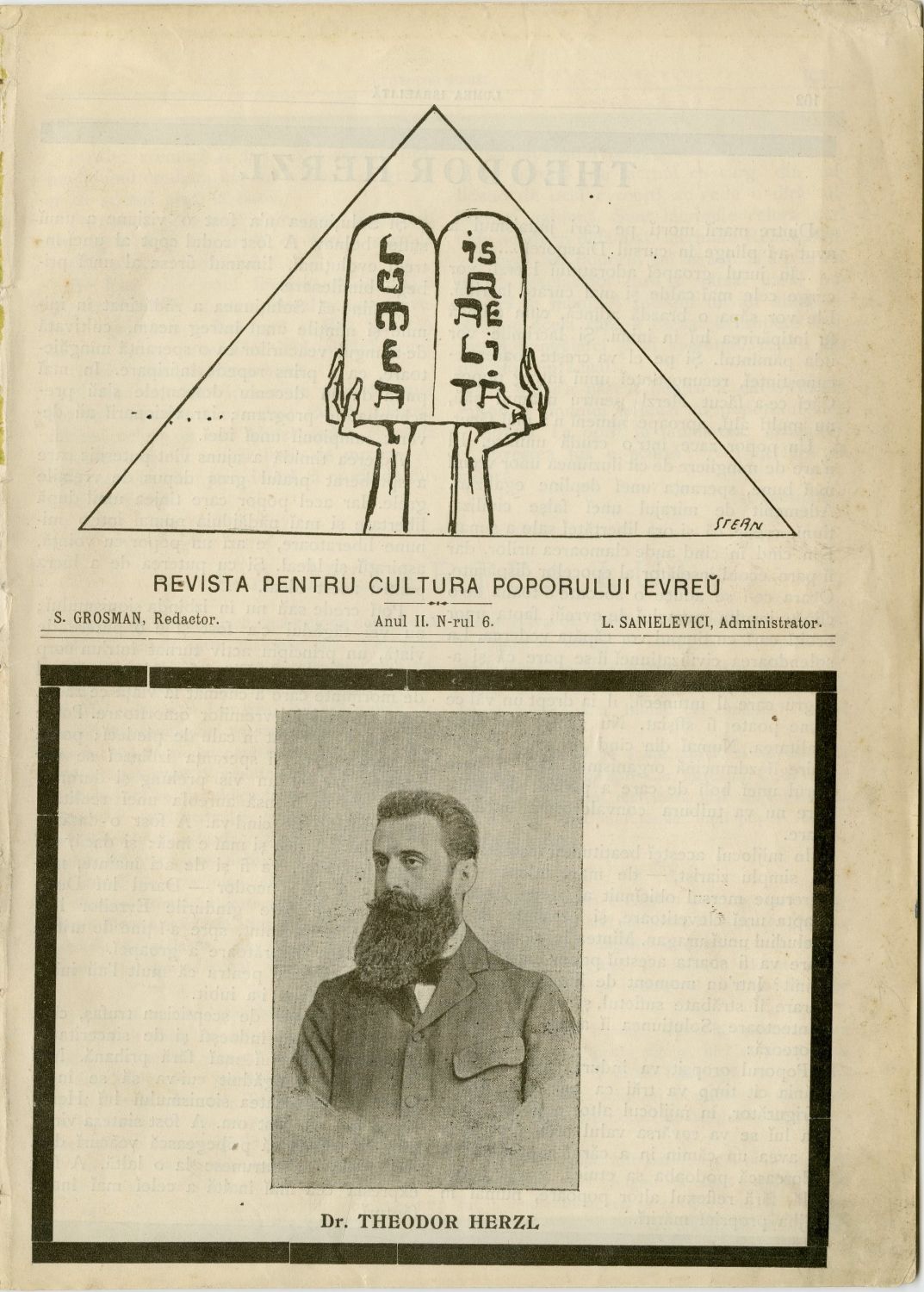
REVISTA PENTRU CULTURA POPORULUI EVREU - A magazine for the culture of the Jewish people edited by S. Grossman. A special issue issued on the death and memory of Theodor Herzl. Romania, July 1904. Rare.
On the cover of the issue Herzl's picture is surrounded by a black frame. The entire first article, also in a black frame, deals entirely with the figure of Theodor Herzl and his Zionist vision, and praises the figure who was not afraid of the waves of anti-Semitism and stood firmly to raise the horn of the Jewish people: "The people of Israel are crying today... they have lost the one who poured into souls the balm of comfort and hope ...". The rest of the articles also deal with the character of Theodor Herzl in his relations with the leaders of the world's countries, with the analysis of Zionist passages he wrote in his books, and with his contribution to the settlement of the Land of Israel. In addition, a special section is dedicated to Herzl's activities in Romania. As well as additional articles on the Jewish education system in Romania, on the ideal of learning the Hebrew language with a special section that interprets Hebrew words in Romanian, the Jewish religion in Romania, and more.
162-192 pp. (Page numbers are consecutive and start from the end of the previous issue). Good condition.
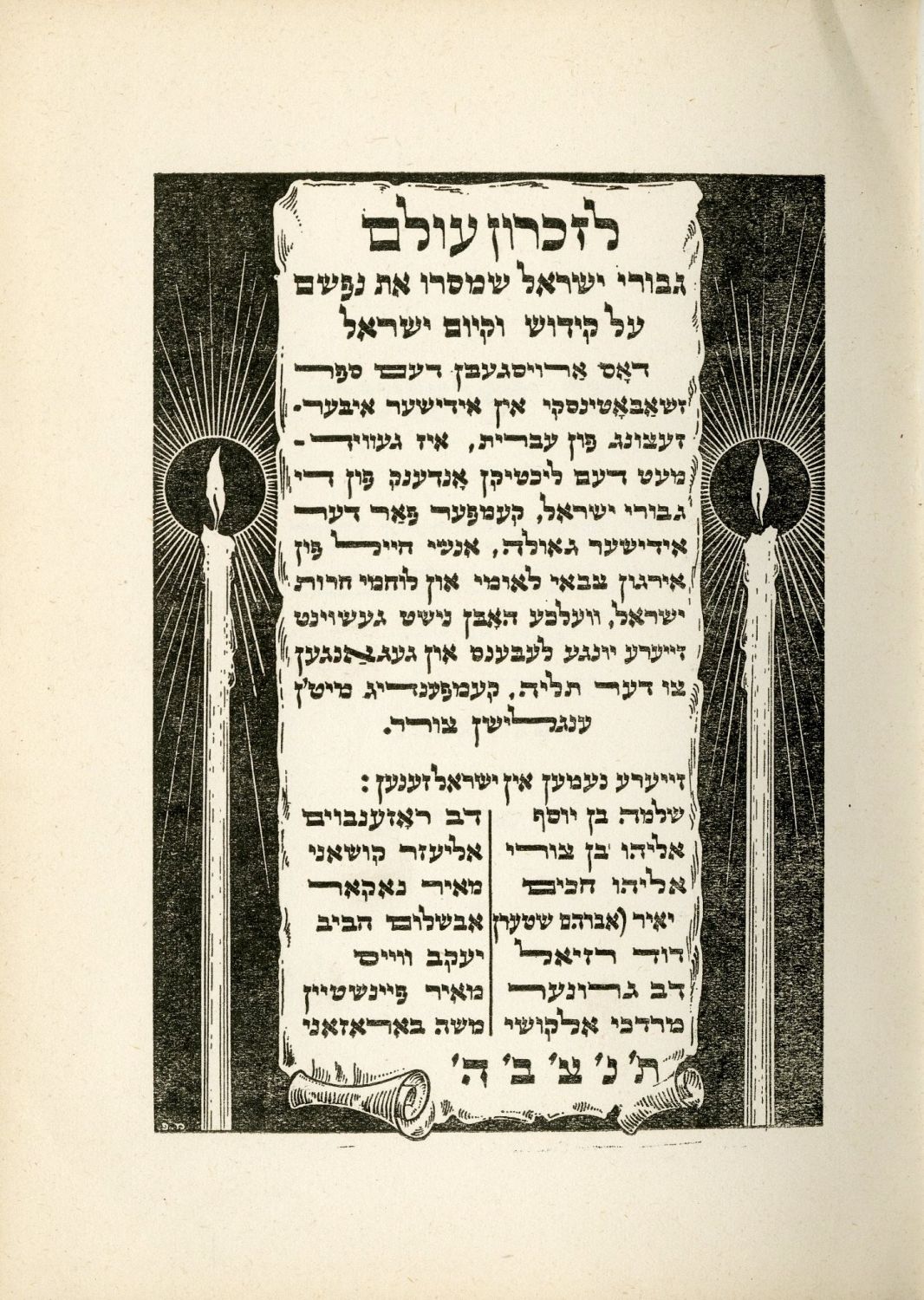
Five rare publications by and about Ze'ev Jabotinsky.
Ze'ev Jabotinsky 'Translations', "Hasefer" publishing house, Berlin 1923. Jabotinsky's translations of folk songs. In the introduction, Jabotinsky writes about himself: "The one who translated the poems collected in this booklet is not a poet. But his opinion is that the language of our new poetry is the Sephardic Hebrew. And if his verses are worthless, his opinion will win."
Ze'ev Jabotinsky, Account of the Testimony to the Royal Commission House of Lords, London, February 11, 1937, published by the Authorized Committee for the New Zionist Organization in Eretz Israel.
Ze'ev Jabotinsky, זאב זשאבאטינסקי, פאר דער קעניגלעכער קאמיסיע 1937 - a rare Yiddish edition of Jabotinsky's speech to the Royal Commission in London 1937.
State Zionism by Vladimir Jabotinsky - English transcript of Jabotinsky's speech about the achievements of the Beitar movement and the revisionists under his leadership, its goals, and mission. No date specified. [Mid 1930s].
Jabotinsky Book, Buenos Aires, 1949. A rare publication about Jabotinsky and his work published in Argentina, with a special memorial page at the beginning of the book for the 'Gallows Pilgrims' including nine of the Irgun soldiers who were executed by hanging by British military tribunals in Israel in 1947. "און געגאנגען צו דער תליה, קעמפענדיג מיט'ן ענגלישן צורר".
general condition good.
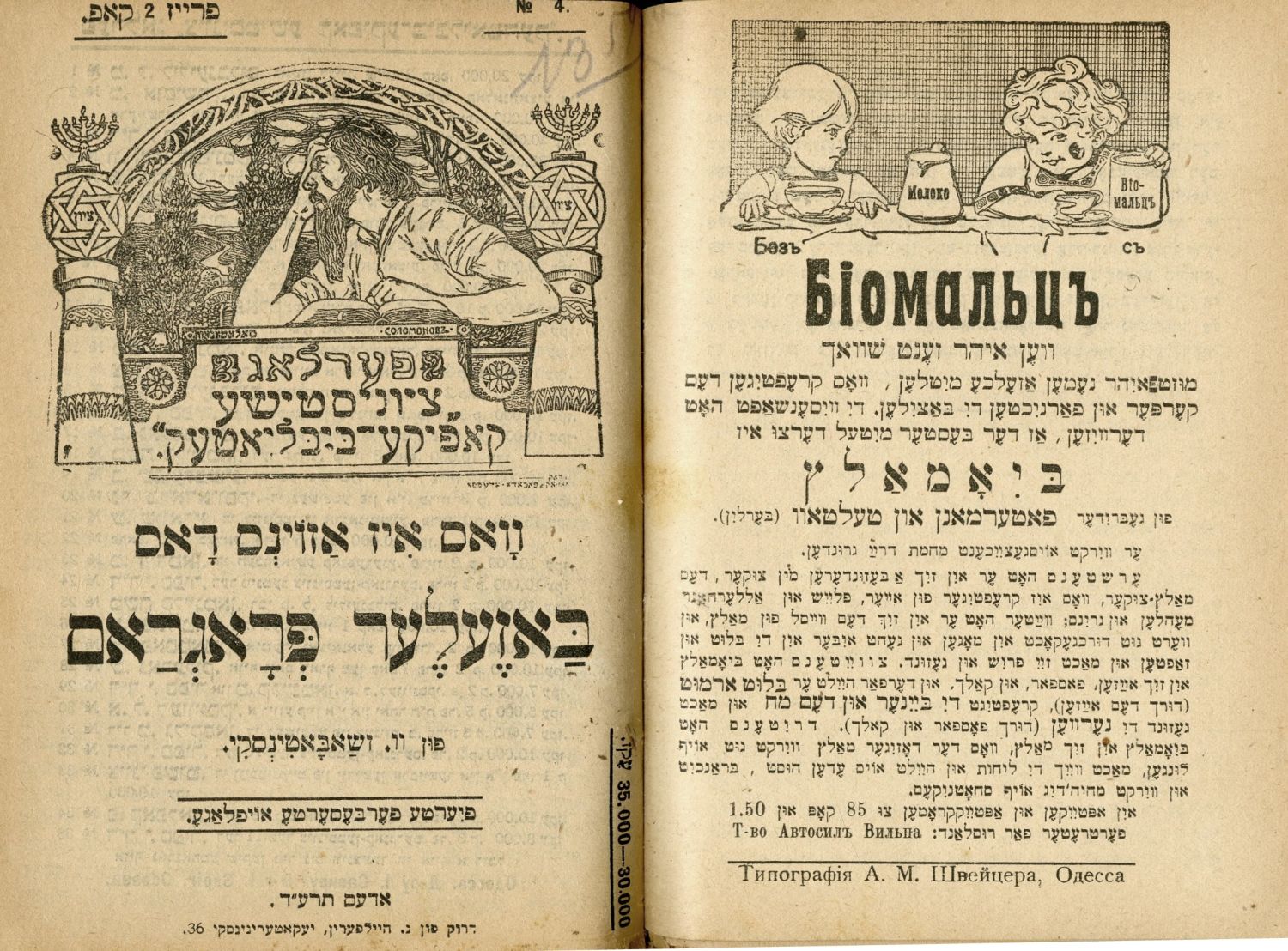
"ציוניסטישע קאפיקע-ביבליאטעק" - Zionist pamphlets sold at Kofika' - 10 pamphlets from the Zionist series which accompanied the Zionist enterprise in its beginnings in articles and reviews. Each booklet was sold for 1 Kupika. Odessa, 1908-1919. Booklets No. 2, 4, 16, 21, 24, 26, 27, 32, 34, 37. Dotted Yiddish.
Each booklet deals with a topic that was important to the Zionist movement at its inception. "The greatness of the tasks facing this nation - Israel, and the Land of Israel. The land must be prepared, and the people must be prepared... the task must be completed..." (from booklet no. 4).
Among the other booklets we mentions: Pamphlet No. 4 dealing with the 'Basel Plan' - 1914, Pamphlet No. 24 - a special pamphlet about the Ninth Zionist Congress held in Hamburg - 1909, Pamphlet No. 34 dealing entirely with the National Library in Jerusalem The treasure of books in her possession and the vision of the development of the Zionist enterprise - 1911, Booklet No. 37 dealing with the Hebrew Shekel during the Second Temple - 1914, Booklet No. 17 dealing with the Jewish Colonial Bank - 1919.
At the top of the booklet title pages is an illustration made by Jacob Stark of Jews longing for Zion against a background of a flowering landscape in the Art Nouveau style, columns topped with a Star of David and the inscription "Zion". The brochures are accompanied by many advertisements for Jewish manufacturing companies in Europe and Eretz Israel.
10 bound booklets (some detached from the cover). 18 cm. Stains, good condition.
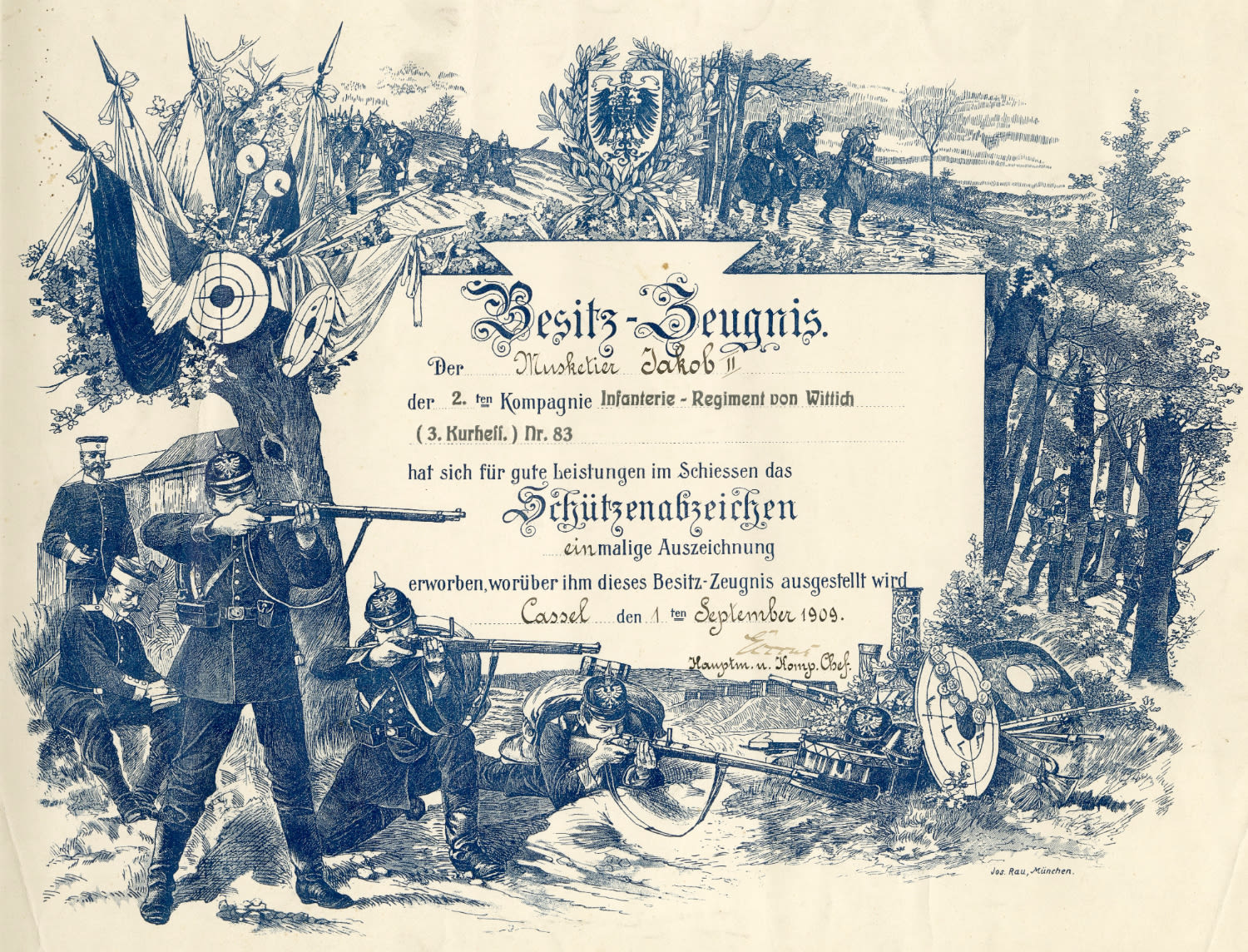
An illustrated certificate of merit for a Jewish soldier named 'Yakob' who served as an infantry soldier of the German 2nd troop - Wittich Regiment. After excelling in accurate shooting he received a "sniper badge". Cassel, September 1909.
Around the inscription is a large illustration of German snipers by the painter Jos. Rau from Munich.
52x36 cm. thick paper. A few stains. Good condition.
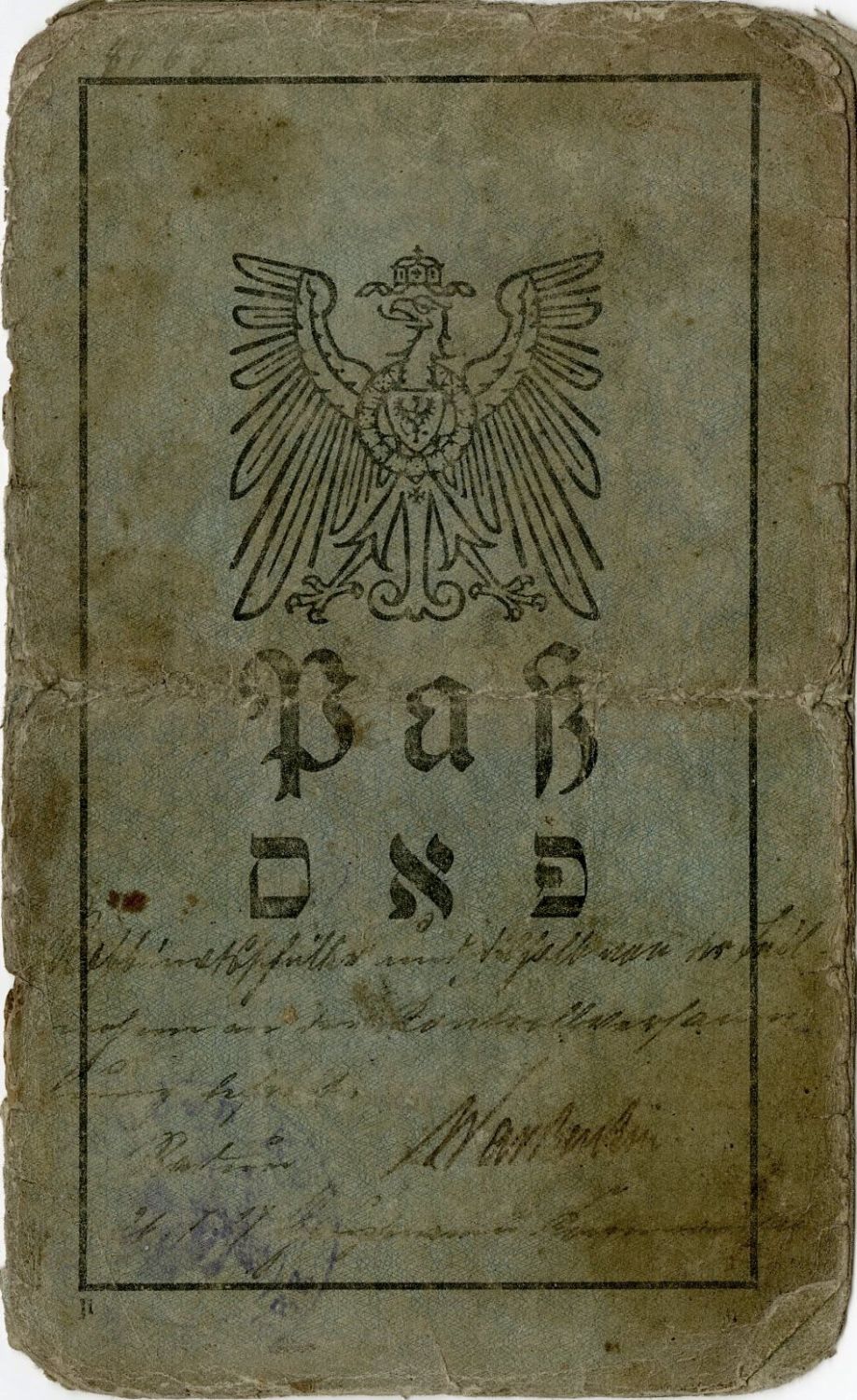
Pass [passport]. A Jewish passport issued by the Gebiet des Oberbefehlshabers Ost [German administration in Ober-Ost] at the end of the First World War, with ink stamps "Verwaltungsgebiet Litauen" - the administration in Lithuania, and handwritten details. In the passport, a photograph of a 22-year-old Jewish boy named Meir Roznikov, born in Radin in 1892, from the region of Grodno administrators during the war, his fingerprint, as well as the ink stamps of the administrator in Lithuania. The details were filled out on September 7, 1916. (and filled out again in 1919).
The passport was issued by the German government in the territories occupied by Germany temporarily in the First World War [including Lithuania, Latvia, Estonia, Belarus, and territories from Poland and Korland]. The sections in which Yiddish and German. Among the articles of the regulations that appear, punishments ranging from five to ten years for a person who is found without a passport, a forged passport, etc. As well as penalties for a person who will not announce the loss of his passport within 24 hours.
[8] pages. 15 cm. Stains. Passport pages are detached. moderate condition.
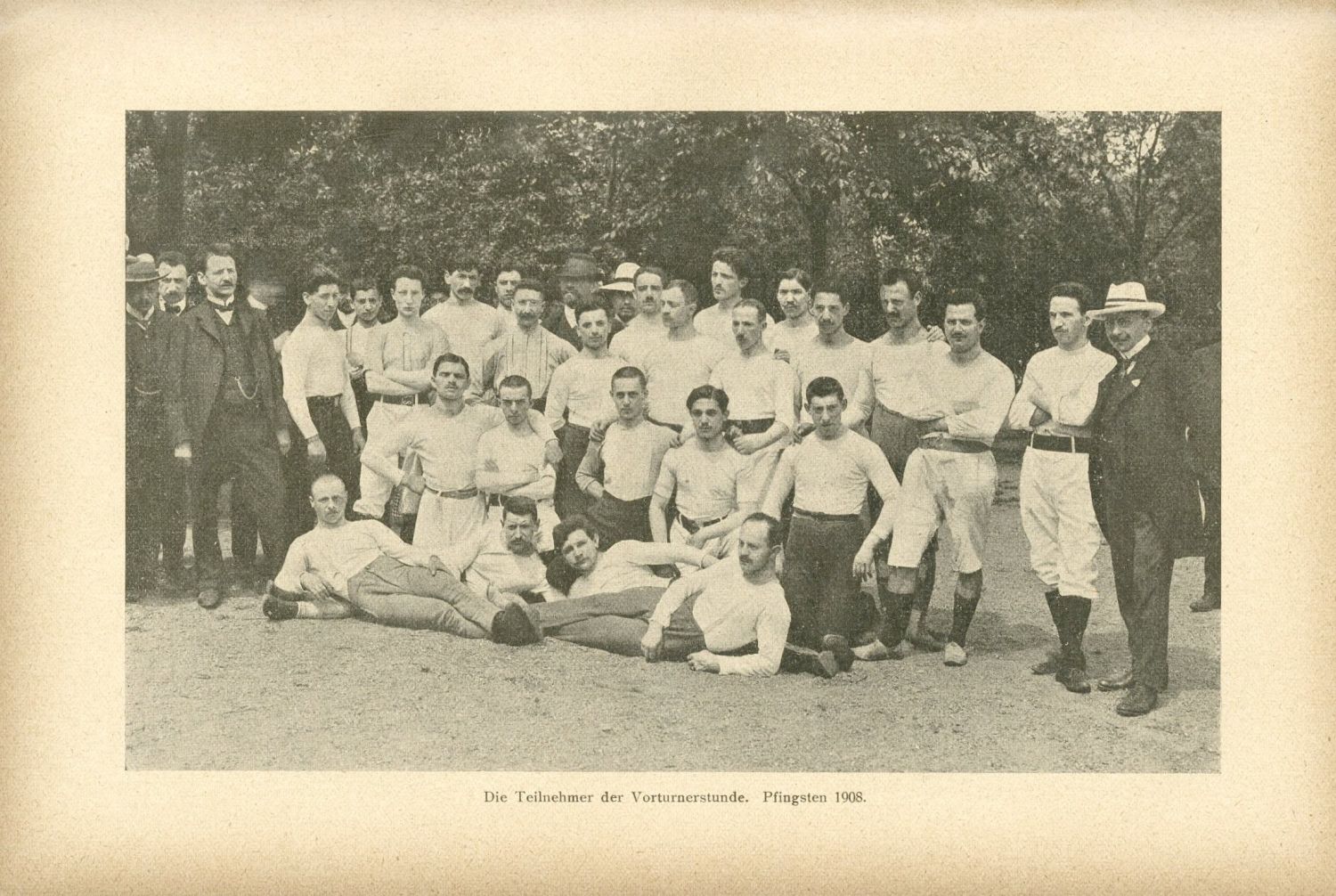
26 issues of the Jewish sports journal "jüdische Turnzeitung" - 'Jewish gymnastics newspaper', Berlin.
Year 1902, issues 4, 6, 7, 11.
Year 1907, consecutive issues 1-10.
Year 1908, consecutive issues 1-12.
In 1898, at the Zionist Congress in Basel, Max Nordau declared on "Muscular Jewry" for the development of the body as part of the idea of the Zionist movement. In the same year, forty-eight young Zionists met in Berlin and founded the "Bar Kochva" club in order to fulfill Nordau's idea in practice. And Indeed, after a few years "Bar Kochba" Berlin became a sports association with the slogan "a healthy mind in a healthy body". Until the First World War, twelve cities in Germany established "Bar Kochba" associations that engaged in the various sports: gymnastics, athletics, tennis, swimming, boxing and wrestling, soccer, women's sports, winter sports and even rowing in boats in the lakes near Berlin. The magazine before us accompanied the association's activities with regular reports on its activities, articles, and photographs of the youth who represented Hebrew sports in Germany in its early years.
In the 1902 issues, the covers are detached. The 1908 issues are bound in an original cover with gilt lettering. general condition good.
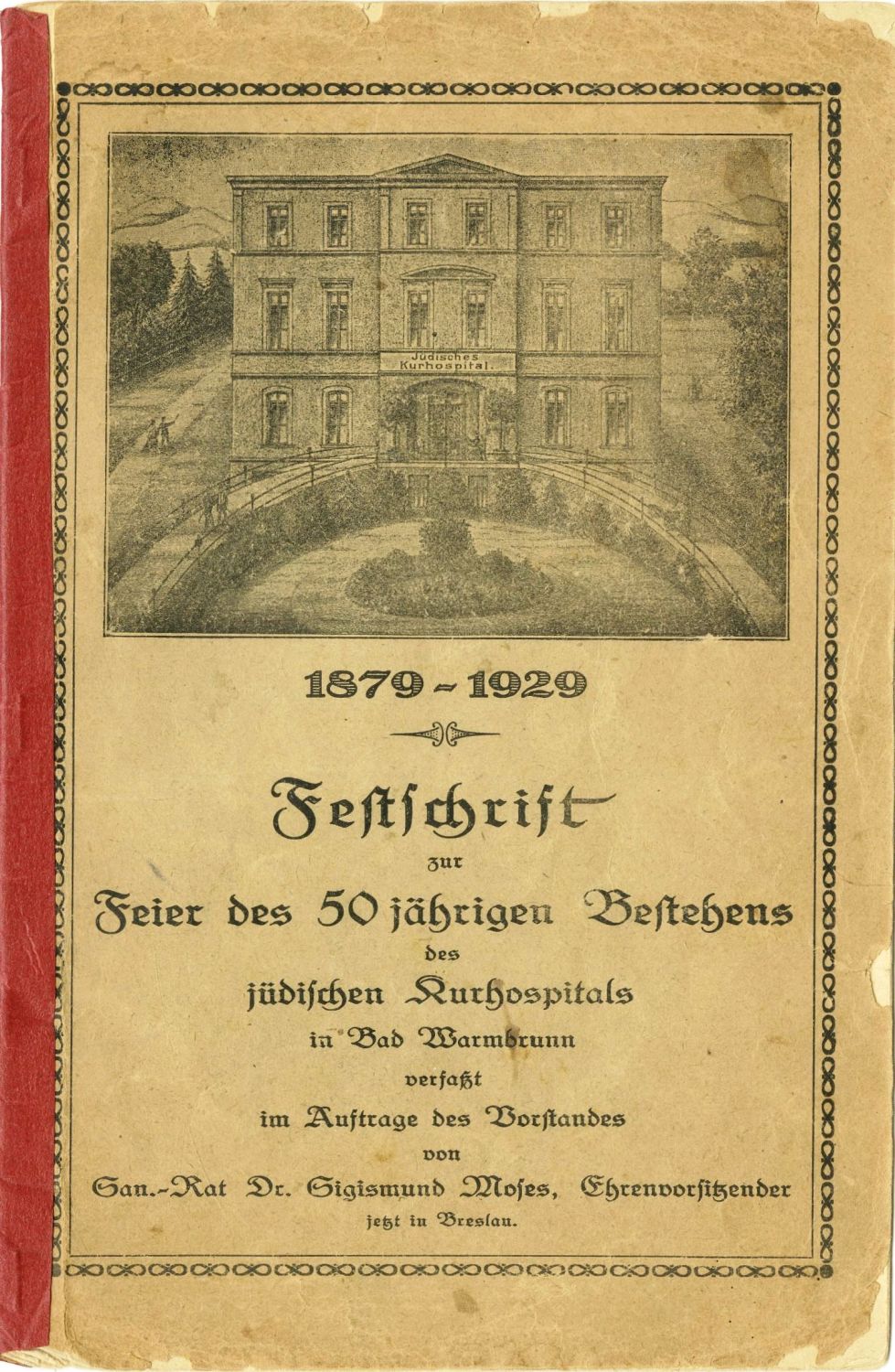
A celebratory booklet released on the occasion of the 50th anniversary celebrations of the Jewish Spa Hospital in Bad Warmbrunn - in Poland 1879-1929, which was established as a charity near the famous healing sulfur hot springs in the town for the benefit of destitute Jews. Written on behalf of the Board of Directors and Honorary Chairman Dr. Sigmund Moses. Bad Warmborn - Poland (then Prussia), Lower Silesia - 1929, German.
In the booklet released for the 50th anniversary of the hospital's founding, a detailed and interesting overview of the past and present about the Jewish hospital in Bad Warmburn (between 1816 and 1945 Warmburn belonged to the Prussian district of Hirschberg). The area where the hospital was located is known for the hot sulfur springs located there, and patients from all the nearby cities and countries came to the place to bathe in the medicinal waters of the spring since the Middle Ages, and it is first mentioned as a healing place as early as 1281. The original Polish name of the area: "Cieplice Śląskie-Zdrój". During the years before the healing house for Jews was established, the visit to the springs was usually possible for wealthy people since staying in the hotels there was expensive, and it was mainly used as a meeting place between the German and Polish aristocracy. With the beginning of the railway era, the number of visits to the place increased, but the visitors could only come for one day, since as mentioned the stay in the nearby hotels was expensive. In 1845, two Jews - Heimann Schneller and Wolf Frankel, citizens of Warmborn, initiated the establishment of the Jewish hospital - spa near the springs, In favor of lower class Jews. They founded the hospital from donations collected from the nearby communities over the years. And only 30 years later since they initiated the idea, after the Prussian-French war, and with the help of those with means in the Jewish communities in Berlin, Breslau, and Hirschberg, they purchased the land and established the hospital - Jewish Spa on the place. The rules for admission to the place were very clear - Only Jews required to take medication due to their health condition were admitted to the hospital. The first twelve guests who arrived each year got to enjoy the place free of charge. During the First World War, the hospital served as a hospital for soldiers wounded in battles.
In the booklet, in addition to a detailed description of the place, its purpose, its structure, and the manner in which it was established, there are dozens of names of donors and shareholders who had a direct part in the establishment of the hospital and its maintenance over the years. The brochure even brings with it a vision for the future and reports that in recent months engineers have arrived at the healing springs to renovate and expand them for future generations. At the end of World War II, after its occupation by the Red Army, the town passed from German hands to the People's Republic of Poland.
The cover shows the front of the hospital - the Jewish Spa. On the last page is an illustration of the snowy mountains from which the healing springs near the hospital arose.
12 pages. 23 cm. Slight tears at the edges of the cover. Good condition.
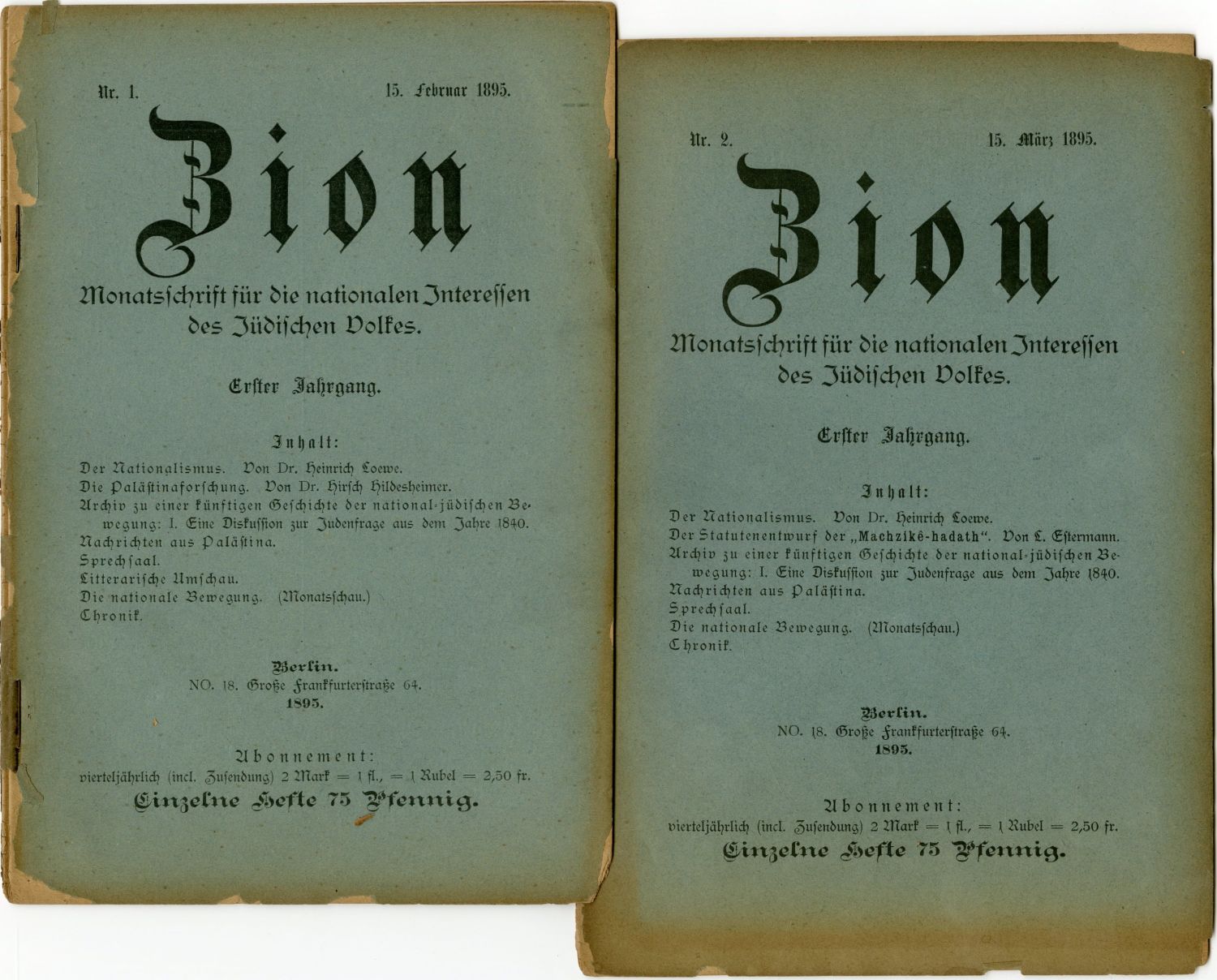
Zion: Monatsschrift für die nationalen Interessen des jüdischen Volkes - Zion: A monthly for the national interests of the Jewish people. Journal edited by W. Bambus, Issues No. 1-2, 6, 9, issued of the first year. Early Zionist periodical. Berlin, 1895. German.
In the Issues news from Palestine, the draft of the articles of association of the Society of Machzikei HaDat, the national movement, the Palestine plan, the Jewish community in Berlin, German Jewry, and more. Among the authors are Dr. Hirsch Heldsheimer, Heinrich Loewe, and others.
Four complete sheets. In some of the sheets pages are detached. Tears in the margins of the title pages of some of the sheets. general condition Good - moderate.
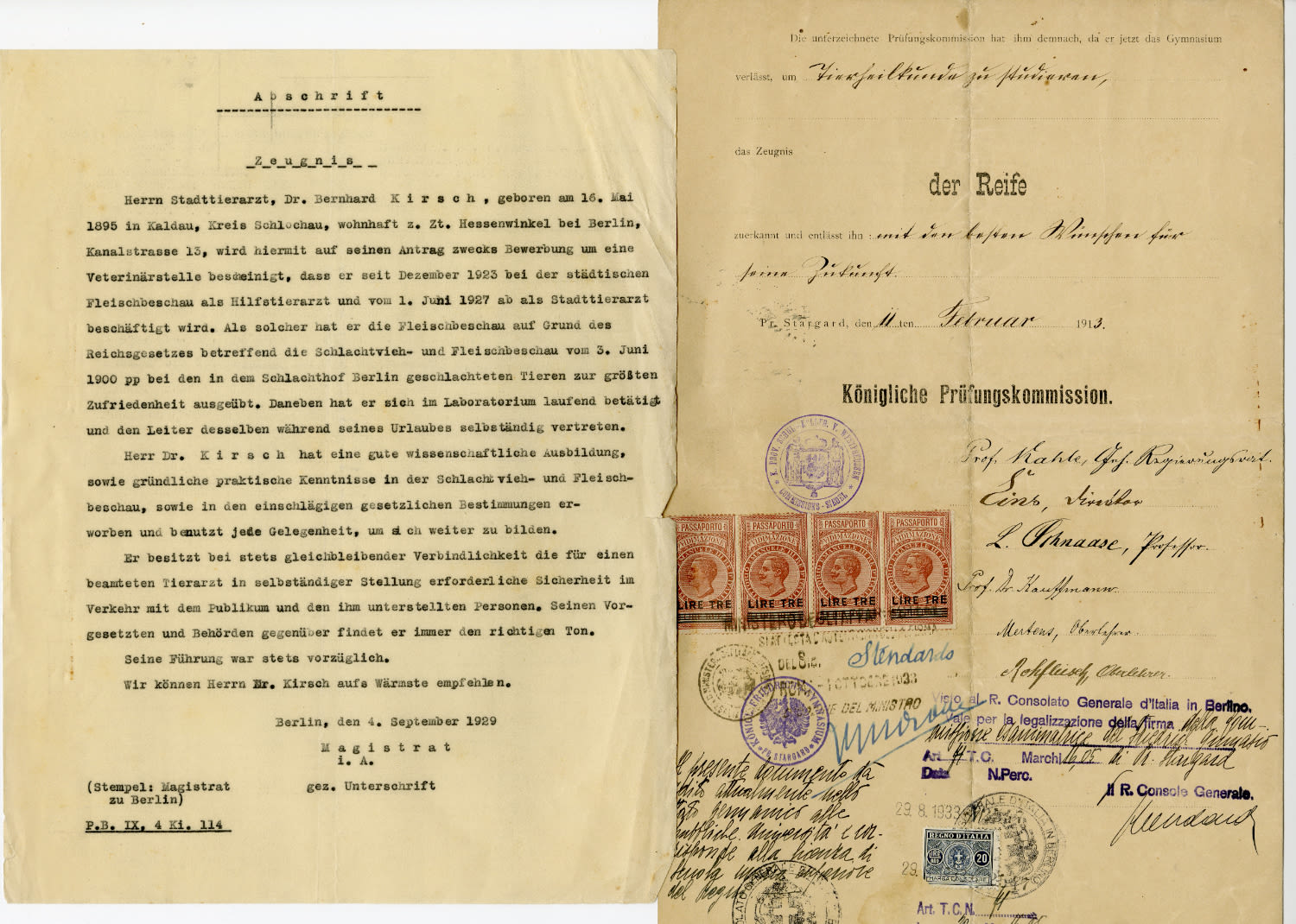
A collection of about 22 certificates and early documents of the Jewish butcher, veterinarian and chief responsible for the urban meat system in Berlin - Bernhard Kirsch. Berlin, Early of the 20th century, until the 30s of the 20th century.
Bernhard Kirsch was born on May 16, 1895 in Kaldau to a well-known horse dealer father, and in his youth moved to Berlin. In the summer of 1913 he began studying veterinary medicine and soon became an expert in the field. During World War I, he worked in the military veterinary service until he was injured in 1918. After the war in Berlin, he was a municipal supervisor of the Jewish slaughterhouse, and a valued expert of the urban meat system in the city until the mid-1930s. He was also the city veterinarian, a respected and well-known expert in the field of animals and meat. Bernhard immigrated to Eretz Israel in the mid-1930s with the rise of the Nazi Party, and continued in his position in Eretz Israel.
In the folder before us are 22 official certificates and early documents dealing with his specialization in the field in his early years. Among the documents that appear: certificates of honor confirming his position and detailing his various specialties in the field of veterinary surgery, the veterinary doctor, and the person responsible for the slaughter even during the First World War, and after that, an official letter of appointment to engage in his position during the First World War. Kirsch's specialization certificates with the signature of the mayor of Berlin in 1931 as well as a certificate signed by the mayor of Berlin from 1932. Certificate of completion of his studies with honors from the Berlin Veterinary School 1916, a certificate of great honors from the Berlin Veterinary School after he studied under Prof. Max Kramer - Berlin November 24, 1923, Official letters of recommendation for Dr. Kirsch detailing his various specialties, a certificate he received at a private school where he completed his studies about a year before leaving Germany in 1933, a certificate of specialization in the treatment of animal diseases that he received upon graduation from the Royal Veterinary College in Berlin in 1924, a Hebrew license On behalf of the Department of Agriculture and Forestry in Palestine which Bernhard received in 1934 after immigrating to Eretz Israel, and other certificates.
About 22 documents and certificates, data in an original folder from the 1930s. General condition good - very good.
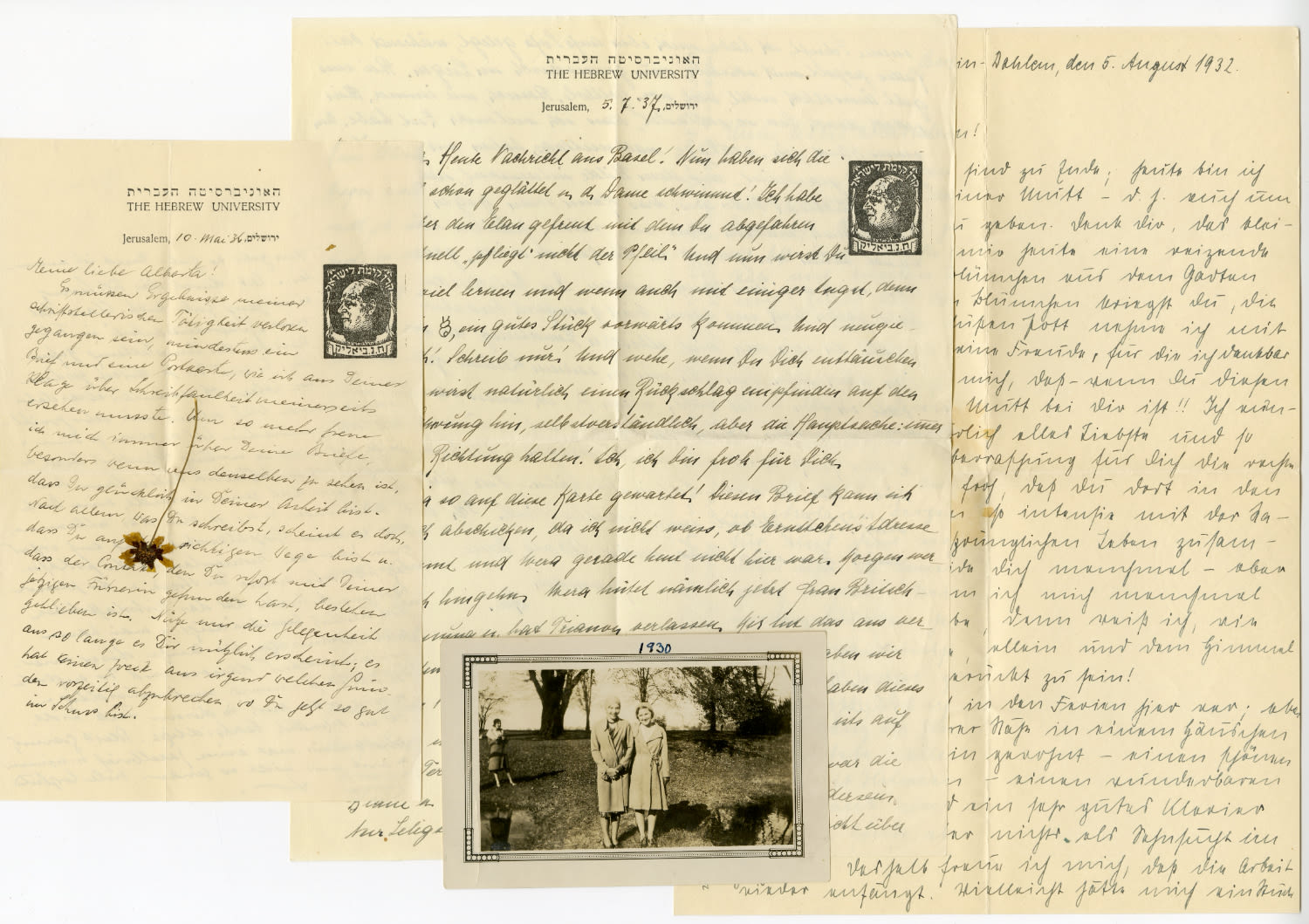
A huge archive of hundreds of personal letters from and Prof. Ludwig Halberstädter - senior doctor and pioneer of cancer treatment in Israel. Hundreds of letters written by him and sent to him in all areas of life - his work as a doctor, his various studies, his managerial positions in the institutions he headed, personal matters between him and his wife, his children's education, and more. Most of the letters are written in German, and they were written in the 1930s while he was the head of the Radium Institute at the Hadassah Hospital for the treatment of malignant diseases. The contents of the letters have not been thoroughly checked by us and are sold as is.
Ludwig Halberstätter [1876-1949] a professor of therapeutic radiology, founded and was the head of the Radium Institute (for the treatment of malignant diseases) at Hadassah Hospital Jerusalem, was a pioneer of cancer treatment in Israel. Born in Bitum in Silesia. He graduated from medical studies in Breslau in 1901. Between 1901-1905 he was an assistant for skin diseases at the Dermatology Clinic at the University of Breslau, and later moved to Berlin. Halberstetter was one of the team members who discovered the generator of trachoma in 1909 in Indonesia. In 1919 he was appointed director of the Radiotherapy Institute at the Cancer Institute in Berlin, and continued his work in Berlin as an associate professor of radiology until the 1930s. He immigrated to Eretz Israel in May 1933, settled in Jerusalem and brought with him 250 milligrams of radium, and established the "Radium Institute" in Hadassah Hospital for the treatment of malignant diseases. From 1933 until his death he headed the Radium Institute in Hadassah Jerusalem. The department was the only one in the Middle East. The department treated dignitaries from Arab countries, as well as patients from the Jordanian and Egyptian royal families. In 1935 he was appointed professor of radiology at the Hebrew University in Jerusalem. Halberstetter was one of the pioneers of cancer research at the Hebrew University together with Dr. Leonid Dolzhansky. During 1937, he made it a point to come to the Hadassah Hospital (Tel Aviv) once a week in order to examine patients and provide treatment and advice, despite the insecurity that prevailed on the roads at the time. During the War of Independence he refused to leave Jerusalem Despite the shelling, out of a desire to set an example and not encourage an escape from Jerusalem. He died in New York in April 1949.
Hundreds of letters, postcards, and more. general condition very good .
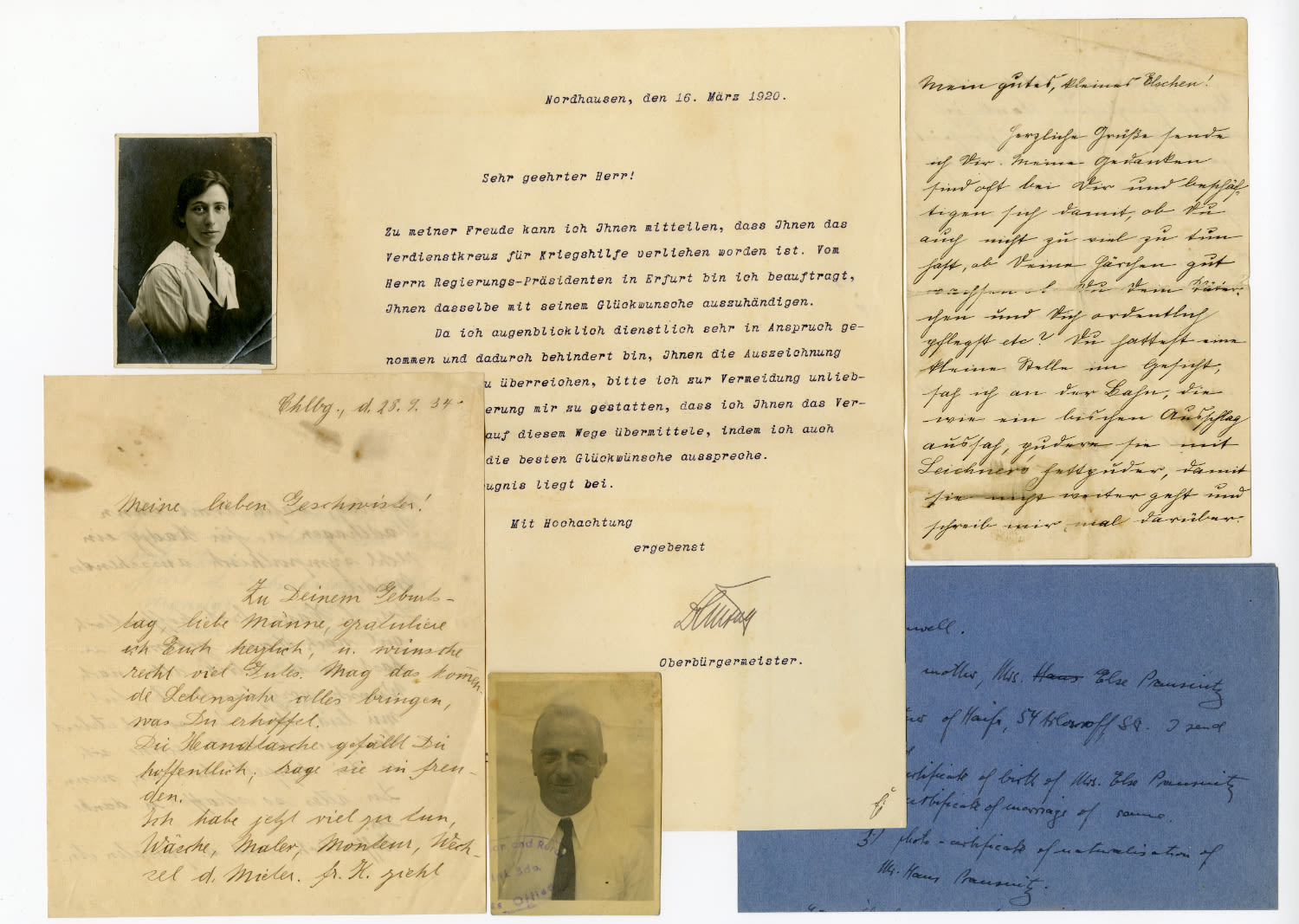
A collection of dozens of letters, documents and photos, of a wealthy Jewish family from Germany, the Prausnitz-Mautner family, from the end of the 19th century, the first decades of the 20th century, and in the 1930s in Germany until they immigrated to Eretz Israel in 1937 and stayed even after the establishment of the state - When the family member Moshe Prausnitz later became a well-known Israeli archaeologist. Most of the documents are in German, few are written in Hebrew.
Among other things, there are documents of Hans and Elsa [née Mautner] and their son Moshe. Hans, born in 1894 in Berlin, was a security engineer and served as a consultant to many German companies even during the Nazi era! His wife Elsa, nee Mautner, born in 1897, comes from a wealthy family that owns a factory in Nordhausen, Germany. Their son Moshe (Max) Prausnitz (1922–1998) was an archaeologist who specialized in the field of prehistory. Prausnitz was born in Berlin and immigrated to Eretz Israel - Haifa with his parents in 1937, at the age of 15. Prausnitz worked in the antiquities department. As part of his work, he managed and dug many archaeological sites.
Among other things appear: family letters written in Hamburg in the years 1911-1912, a letter from Rabbi Jacob Shechter regarding the family's roots, letters announcing to the family's daughter Olga Mautner that she received the Cross of Honor for assistance during the First World War, photographs of the family members, documents related to the family business, and other documents which were not thoroughly checked by us.
Dozens of documents in a folder from the 1930s, overall good condition.
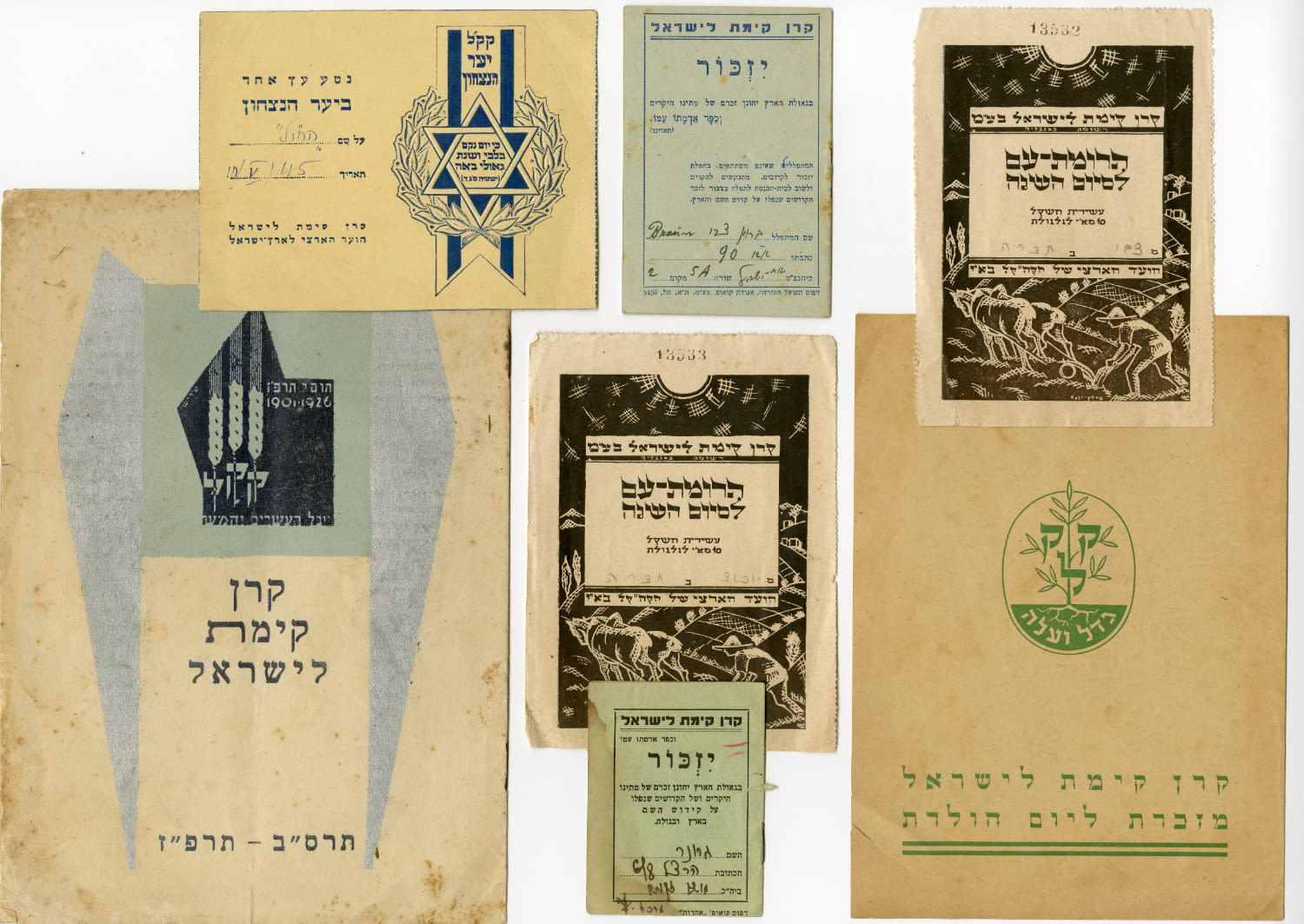
An important collection of 42 cards, notebooks, labels, travel tickets, announcements, advertisement pages, and brochures issued in the Land of Israel in the first decades of the 20th century.
among:
JNF items: program for the festive meeting of JNF 1902 - 1927 which was held in Jerusalem in 1926, two 'Yizkor' notebooks for the saints of the homeland, two 'trumat Am' receipts for the end of the year - serial numbers 13532 and 13533, a 'souvenir' certificate for a birthday' with Bialik's picture.
Various cards and advertisement pages: Entrance tickets to plays, Entrance ticket to the 26th Zionist Congress in Jerusalem, a booklet 'For the Children' published by the Yehuda Hatzair project, various food labels, notebook of stations list that can be received on radio from Eretz Israel, and more.
Announcements: A special prayer from the rabbis of the Bukhari sect after the riots of 1929, a young Hebrew! Come and volunteer for recruitment, a Hebrew consumer, a Hebrew woman! - Do not buy from the peddlers selling foreign products in the Carmel market, notice due to a misunderstanding the police were invited to the "Rama" cinema on the night of the publication of the Land Law, and more.
Travel tickets of early bus companies in the Land of Israel: HaMekasher, Hama'avir, Egged, Dan, an early flight ticket of the Arkia company.
Various sizes and conditions. General condition good - very good.
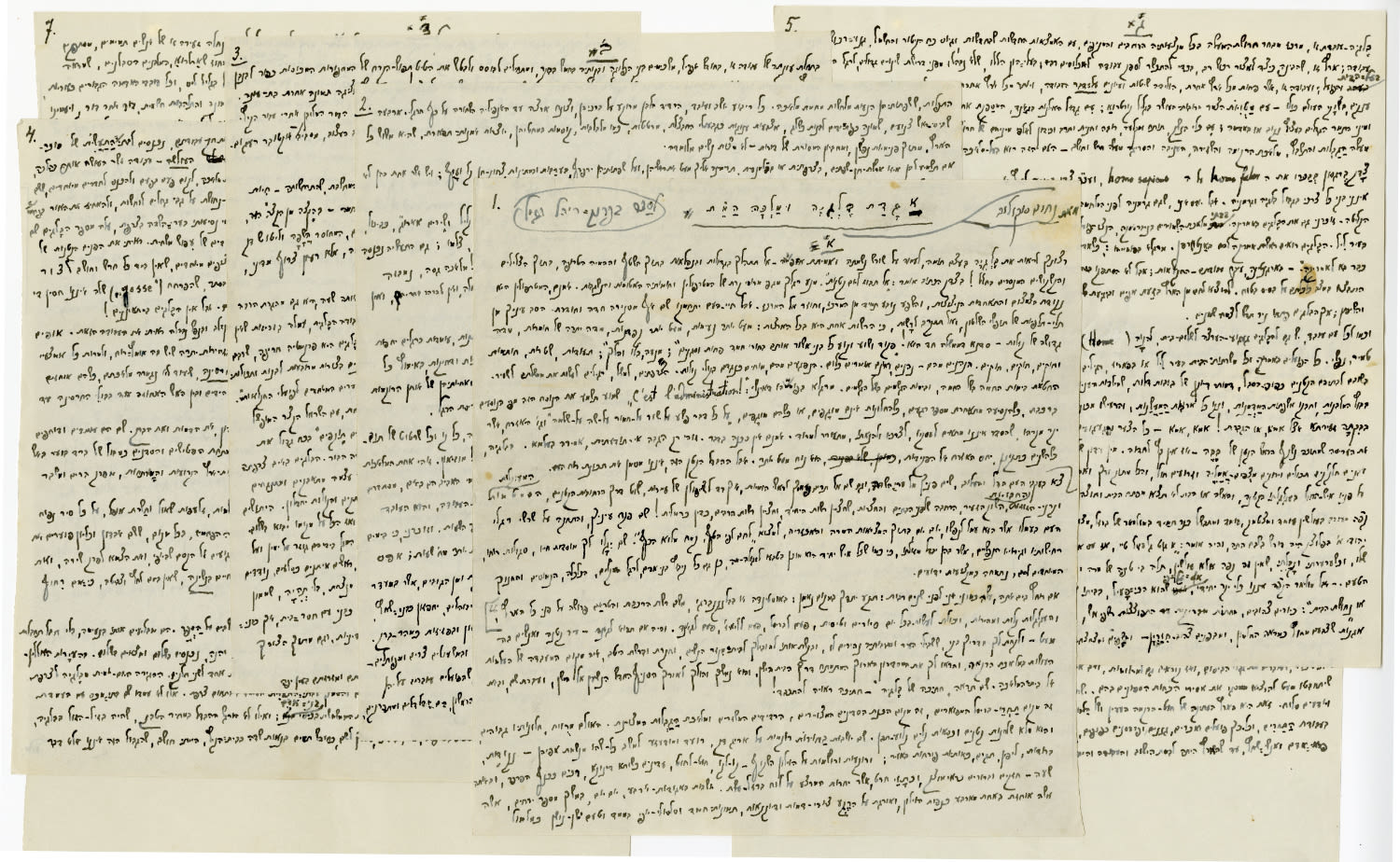
The legend of Belgium and its dead king, a complete essay in the handwriting and full signature of the president of the Zionist Organization Nahum Sokolov [1859-1936].
A ten-page story written in the handwriting of Nahum Sokolov about King Albert I of Belgium who was the third king of Belgium from December 23, 1909, after the death of Leopold II. The story deals with the interesting composition of the Belgian population and the efficient manner in which the Belgian workers perform their work, as well as the effects related to the migration of the Belgians to France, and the Second World War when Belgium fought Germany, and the wise manner in which Belgium led the economy during the war. Some argue that Sokolov wrote the essay to outline a path for the Zionist leadership, that even during a crisis in front of powerful countries it is possible to keep calm, and move forward to achieve the goals with wisdom and determination, and also because of his personal sympathy for King Albert.
King Albert was very sympathetic to the Zionist issue, and even had connections with the top Zionist leaders. On April 13, 1933, about a year before his death, the king visited Tel Aviv - he was the first king to be hosted in the Land of Israel. During his visit, he met with Tel Aviv Mayor Meir Dizengoff and other dignitaries, in their ears he expressed his support for the Zionist idea and even promised to return, but a year later he was killed in a fall in a mountain climbing accident, and Dizengoff, grief stricken, led the commemoration movement to erect a square named after him in Tel Aviv "Albert Square".
10 written pages. 21x20 cm. Very good condition.
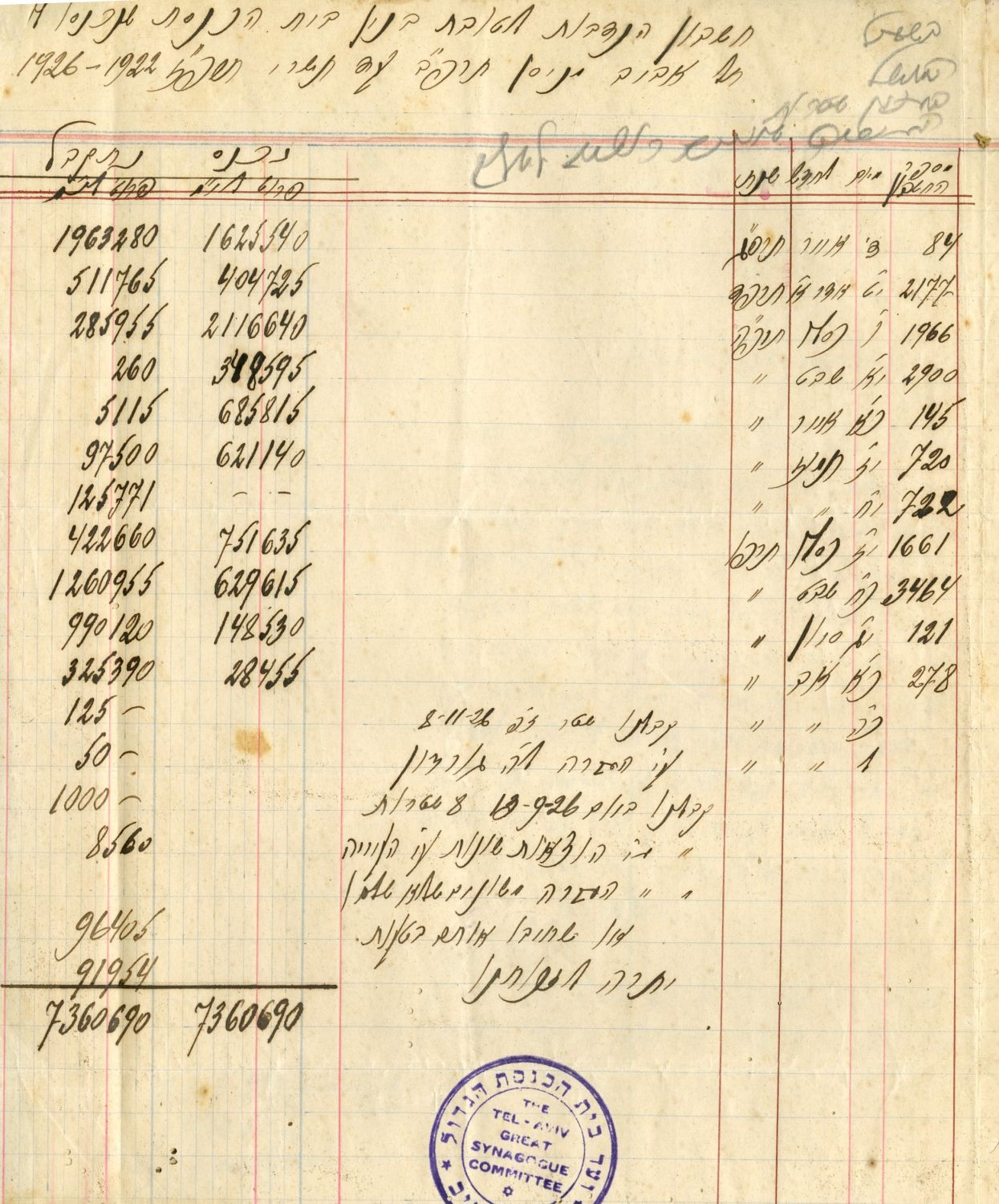
The book of lists of the Great Synagogue in Tel Aviv in the years 1923-1926 - hundreds of handwritten pages that include many lists of names of community members, synagogue worshipers, and donors, the account of donations for the construction of the synagogue, as well as pages with notes from those involved in the day-to-day management of the synagogue, A detailed list of amounts donated to the synagogue over a three-year period, and more.
The Great Synagogue is located between Allenby 110 and Ahad Ha'am in Tel Aviv. Already at the end of 1910, plans were started for the establishment of a synagogue and for this purpose field was allocated in a high place at the edge of the neighborhood between Yehuda Halevi Street and Neve Tzedek and Neve Shalom neighborhoods. In April 1911, the cornerstone was laid for a large synagogue to be built on Yehuda Halevi Street. The building has undergone many upheavals over the years, and it is considered one of the most important central buildings in the essence of "Little Tel Aviv".
Hundreds of pages in an old cardboard cover. 31 cm. Moth marks on the cardboard cover and some of the pages. Detached cover. overall condition moderate.
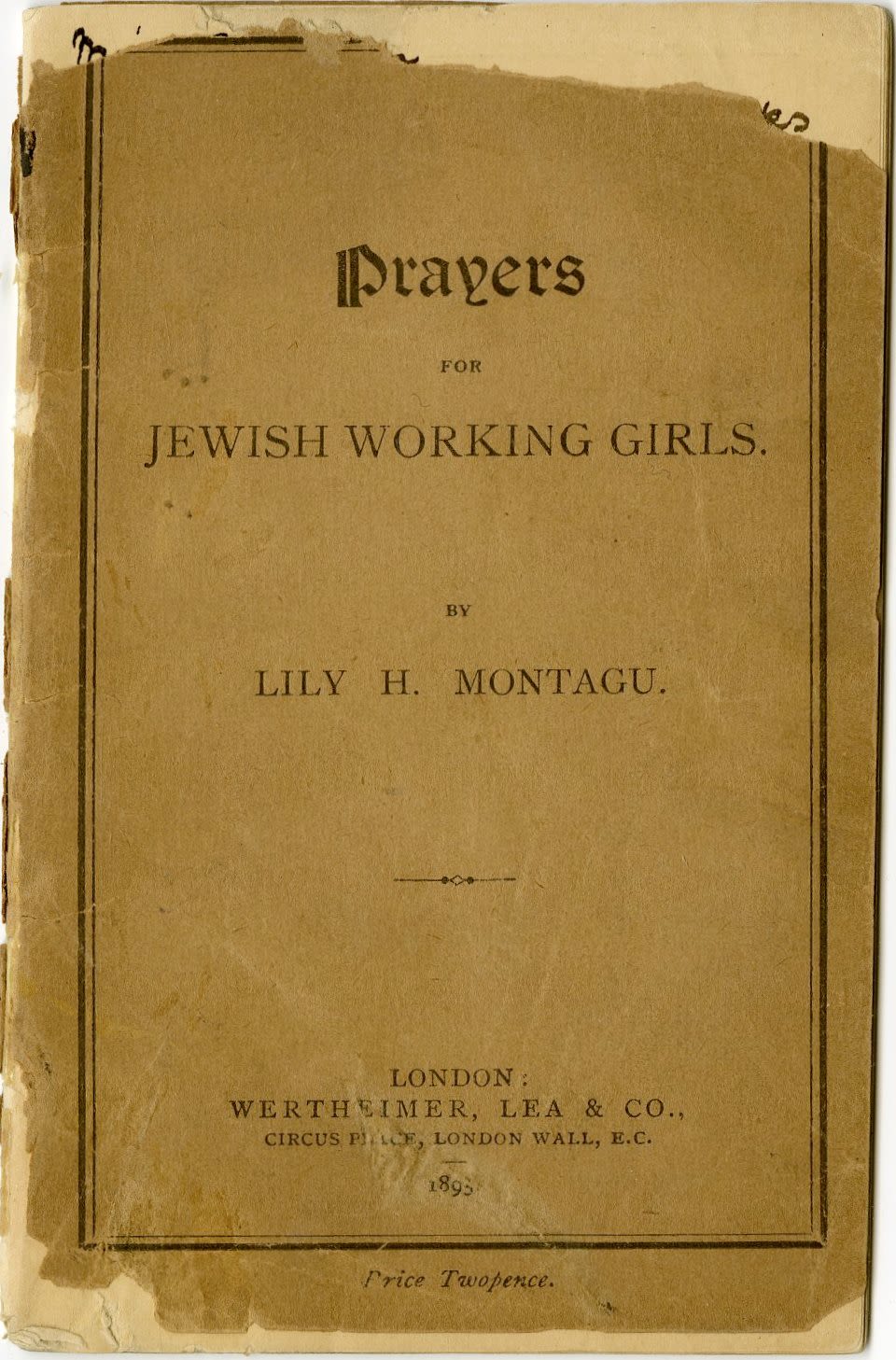
Prayers for jewish working girls, by Lily Helen Montagu, London 1895 - first edition. A rare and early prayer book in a pocket edition, written by Montague, the woman who led the current of liberal Judaism, and one of the leading Jewish women in social action in England. A copy with the dedication of the author to her friend Mrs. Reichman, dated: 6/3/1899.
The Book of Prayers was intended for Jewish girls from the working class, and in it Montague intended to develop them socially, intellectually and spiritually. It includes prayers that she composed in all areas of life that encompass the life of Bat Israel - prayers for pleasant and easy work, thanksgiving to G-d for youth and success, requests for right thoughts and ambition, requests for forgiveness of sins, special prayers for every day of the week, special prayers for Shabbat, prayers for the day of engagement and the wedding, requests for times of trouble, and more. Of the rarer publications of Montague, in many of the bibliography lists of her compositions, it does not appear at all, And as mentioned with Montagu signed dedication.
Lillian (Lily) Helen Montague (1873-1963) was a social worker, judge in a London juvenile court, and the first woman to act centrally and was the driving force behind liberal Judaism in England. Published many articles to strengthen the religious life of the Anglo-Jewish community through the spread of liberal Judaism, organized conferences, and was the living spirit behind the establishment of liberal institutions in England. In 1928 she became the head of the Central West Liberal Jewish Community, a position she officially accepted in November 1944 and held until her death in 1963.
32 pages. 12.5 cm. Detached paper cover with tears in the margin. The body of the booklet is in good condition.
Created and Develop with 🤍By webe ©2024